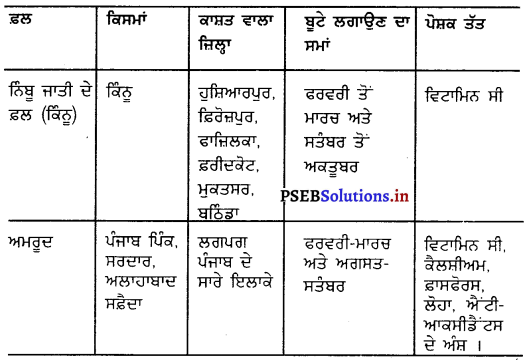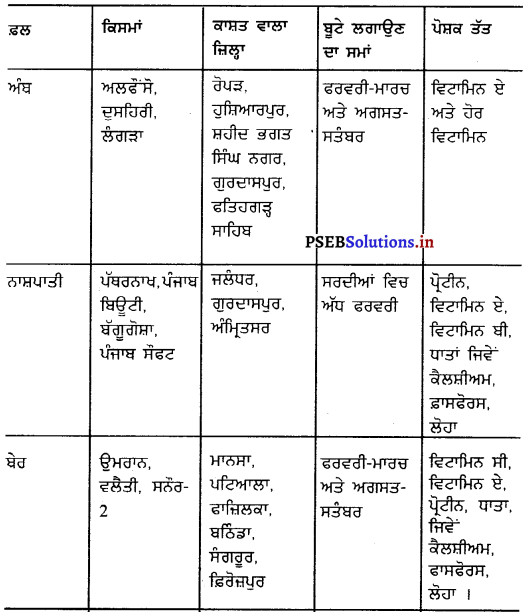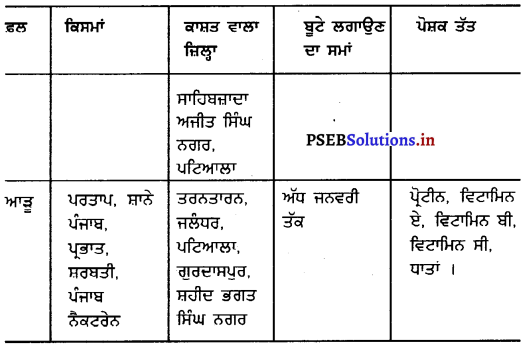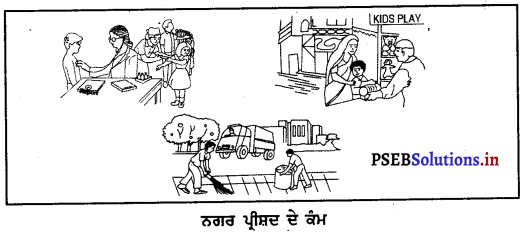Punjab State Board PSEB 6th Class Agriculture Book Solutions Chapter 6 ਖੇਤੀ ਸੰਦ ਅਤੇ ਮਸ਼ੀਨਾਂ Textbook Exercise Questions and Answers.
PSEB Solutions for Class 6 Agriculture Chapter 6 ਖੇਤੀ ਸੰਦ ਅਤੇ ਮਸ਼ੀਨਾਂ
Agriculture Guide for Class 6 PSEB ਖੇਤੀ ਸੰਦ ਅਤੇ ਮਸ਼ੀਨਾਂ Textbook Questions and Answers
ਅਭਿਆਸ
(ਉ) ਹੇਠ ਲਿਖੇ ਪ੍ਰਸ਼ਨਾਂ ਦਾ ਇੱਕ ਜਾਂ ਦੋ ਸ਼ਬਦਾਂ ਵਿੱਚ ਉੱਤਰ ਦਿਓ-
ਪ੍ਰਸ਼ਨ 1.
ਫ਼ਸਲਾਂ ਦੀ ਗਹਾਈ ਲਈ ਕਿਹੜੀ ਮਸ਼ੀਨ ਵਰਤੀ ਜਾਂਦੀ ਹੈ ?
ਉੱਤਰ-
ਥਰੈਸ਼ਰ ਦੀ ।
ਪ੍ਰਸ਼ਨ 2.
ਪੱਠੇ ਕੁਤਰਨ ਵਾਲੀ ਮਸ਼ੀਨ ਨੂੰ ਕੀ ਆਖਦੇ ਹਨ ?
ਉੱਤਰ-
ਟੋਕਾ ।

ਪ੍ਰਸ਼ਨ 3.
ਭੂਮੀ ਨੂੰ ਪੱਧਰਾ ਅਤੇ ਭੁਰਭੁਰਾ ਕਿਸ ਨਾਲ ਕਰਦੇ ਹਨ ?
ਉੱਤਰ-
ਸੁਹਾਗੇ ਨਾਲ ।
ਪ੍ਰਸ਼ਨ 4. ਖੇਤ ਵਿਚ ਵੱਟਾਂ ਬਣਾਉਣ ਲਈ ਕਿਹੜੇ ਸੰਦ ਦੀ ਵਰਤੋਂ ਕੀਤੀ ਜਾਂਦੀ ਹੈ ?
ਉੱਤਰ-
ਜਿੰਦਰਾ ।
ਪ੍ਰਸ਼ਨ 5.
ਗੋਡੀ ਲਈ ਵਰਤੇ ਜਾਣ ਵਾਲੇ ਦੋ ਯੰਤਰਾਂ ਦੇ ਨਾਂ ਦੱਸੋ ?
ਉੱਤਰ-
ਖੁਰਪੀ, ਕਸੌਲਾ, ਪਹੀਏਦਾਰ ਸੰਦ ।
ਪ੍ਰਸ਼ਨ 6.
ਫ਼ਸਲਾਂ ਅਤੇ ਕੀੜੇਮਾਰ ਦਵਾਈਆਂ ਦਾ ਛਿੜਕਾਅ ਕਰਨ ਵਾਲੇ ਸੰਦਾਂ ਦੇ ਨਾਂ ਦੱਸੋ ?
ਉੱਤਰ-
ਬਾਲਟੀ ਸਪ੍ਰੇਅਰ, ਰੌਕਰ ਸਪ੍ਰੇਅਰ, ਨੈਪਸੈਕ ਸਪੇਅਰ ।
ਪ੍ਰਸ਼ਨ 7.
ਬੀਜ ਬੀਜਣ ਲਈ ਵਰਤੀ ਜਾਣ ਵਾਲੀ ਮਸ਼ੀਨ ਦਾ ਨਾਂ ਦੱਸੋ ?
ਉੱਤਰ-
ਬੀਜ ਅਤੇ ਖਾਦ ਡਰਿਲ ।

ਪ੍ਰਸ਼ਨ 8.
ਖੇਤੀ ਕਾਰਜਾਂ ਲਈ ਵਰਤੀਆਂ ਜਾਣ ਵਾਲੀਆਂ ਦੋ ਮਸ਼ੀਨਾਂ ਦੇ ਨਾਂ ਦੱਸੋ ।
ਉੱਤਰ-
ਹੈਪੀਸੀਡਰ, ਥਰੈਸ਼ਰ ।
ਪ੍ਰਸ਼ਨ 9.
ਟਰੈਕਟਰ ਕਿੰਨੀ ਸ਼ਕਤੀ ਦੇ ਹੁੰਦੇ ਹਨ ?
ਉੱਤਰ-
5 ਹਾਰਸ ਪਾਵਰ ਤੋਂ ਲੈ ਕੇ 90 ਹਾਰਸ ਪਾਵਰ ।
ਪ੍ਰਸ਼ਨ 10.
ਲੇਜ਼ਰ ਲੈਂਡ ਲੈਵਲਰ ਦੀ ਵਰਤੋਂ ਕਿਉਂ ਕੀਤੀ ਜਾਂਦੀ ਹੈ ?
ਉੱਤਰ-
ਜ਼ਮੀਨ ਨੂੰ ਪੱਧਰਾ ਕਰਨ ਲਈ ।
(ਅ) ਹੇਠ ਲਿਖੇ ਪ੍ਰਸ਼ਨਾਂ ਦਾ ਇੱਕ ਜਾਂ ਦੋ ਵਾਕਾਂ ਵਿਚ ਉੱਤਰ ਦਿਓ-
ਪ੍ਰਸ਼ਨ 1.
ਡੀਜ਼ਲ ਇੰਜਣ ਦਾ ਖੇਤੀ ਕਾਰਜਾਂ ਵਿਚ ਕੀ ਮਹੱਤਵ ਹੈ ?
ਉੱਤਰ-
ਡੀਜ਼ਲ ਇੰਜਣ ਟਰੈਕਟਰ ਤੋਂ ਛੋਟੀ ਮਸ਼ੀਨ ਹੈ ਅਤੇ ਜਿੱਥੇ ਘੱਟ ਸ਼ਕਤੀ ਦੀ ਲੋੜ ਹੋਵੇ ਉੱਥੇ ਇਸਦੀ ਵਰਤੋਂ ਕੀਤੀ ਜਾਂਦੀ ਹੈ । ਇਸ ਦੀ ਵਰਤੋਂ ਕਰਕੇ ਟਿਉਬਵੈੱਲ, ਚਾਰਾ ਕੁਤਰਨ ਵਾਲਾ ਟੋਕਾ, ਦਾਣੇ ਕੱਢਣ ਵਾਲੀ ਮਸ਼ੀਨ ਆਦਿ ਨੂੰ ਚਲਾਇਆ ਜਾ ਸਕਦਾ ਹੈ । ਇਸ ਵਿਚ ਤੇਲ ਅਤੇ ਮੁਰੰਮਤ ਦਾ ਖ਼ਰਚਾ ਟਰੈਕਟਰ ਦੀ ਤੁਲਨਾ ਵਿਚ ਘੱਟ ਹੈ ।

ਪ੍ਰਸ਼ਨ 2.
ਉਲਟਾਵਾਂ ਹਲ ਕੀ ਹੈ ? ਇਸ ਦੇ ਕੀ ਲਾਭ ਹਨ ?
ਉੱਤਰ-
ਇਹ ਹਲ ਲੋਹੇ ਦਾ ਬਣਿਆ ਹੁੰਦਾ ਹੈ । ਇਸ ਹਲ ਨਾਲ ਜ਼ਮੀਨ ਦੀ ਹੇਠਲੀ ਤਹਿ ਉੱਪਰ ਆ ਜਾਂਦੀ ਹੈ ਤੇ ਉੱਪਰਲੀ ਤਹਿ ਹੇਠਾਂ ਚਲੀ ਜਾਂਦੀ ਹੈ ।
ਜਦੋਂ ਦੋ ਫ਼ਸਲਾਂ ਦੇ ਵੱਢਣ ਅਤੇ ਬੀਜਣ ਵਿੱਚ ਵੱਧ ਸਮਾਂ ਲਗਦਾ ਹੋਵੇ ਤਾਂ ਇਸ ਹਲ ਦੀ ਵਰਤੋਂ ਨਾਲ ਕਾਫ਼ੀ ਲਾਭ ਹੁੰਦਾ ਹੈ । ਇਸ ਨਾਲ ਜ਼ਮੀਨ ਉੱਪਰ ਪਿਆ ਘਾਹ ਫੂਸ ਜ਼ਮੀਨ ਹੇਠਾਂ ਦੱਬ ਜਾਂਦਾ ਹੈ ਤੇ ਗਲ-ਸੜ ਕੇ ਖਾਦ ਦਾ ਕੰਮ ਕਰਦਾ ਹੈ । ਜ਼ਮੀਨ ਹੇਠਾਂ ਘਾਹ-ਫੂਸ ਤੇ ਜੜਾਂ ਆਦਿ ਉੱਪਰ ਆ ਜਾਂਦੀਆਂ ਹਨ ਅਤੇ ਜ਼ਮੀਨ ਵਿਚਲੇ ਹਾਨੀਕਾਰਕ ਜੀਵਾਣੁ ਧੁੱਪ ਨਾਲ ਖ਼ਤਮ ਹੋ ਜਾਂਦੇ ਹਨ ।
ਪ੍ਰਸ਼ਨ 3.
ਨਦੀਨਾਂ ਦੀ ਰੋਕਥਾਮ ਕਿਵੇਂ ਕੀਤੀ ਜਾ ਸਕਦੀ ਹੈ ?
ਉੱਤਰ-
ਨਦੀਨਾਂ ਦੀ ਰੋਕਥਾਮ ਲਈ ਗੁਡਾਈ ਕੀਤੀ ਜਾਂਦੀ ਹੈ । ਇਸ ਲਈ ਖੁਰਪਾ, ਕਸੌਲਾ ਅਤੇ ਤਿਰਵਾਲੀ ਜਾਂ ਟਰੈਕਟਰ ਪਿੱਛੇ ਟਿੱਲਰ ਦੀ ਵਰਤੋਂ ਕੀਤੀ ਜਾਂਦੀ ਹੈ ।
ਪ੍ਰਸ਼ਨ 4.
ਟੋਕਾ ਕਿਸ ਨੂੰ ਆਖਦੇ ਹਨ ? ਇਹ ਕਿਸ ਕੰਮ ਆਉਂਦਾ ਹੈ ?
ਉੱਤਰ-
ਟੋਕਾ ਇੱਕ ਪੱਠੇ ਕੁਤਰਨ ਵਾਲੀ ਮਸ਼ੀਨ ਹੈ । ਪਸ਼ੂਆਂ ਦਾ ਚਾਰਾ ਕੁਤਰਣ ਲਈ ਇਸ ਨੂੰ ਵਰਤਿਆ ਜਾਂਦਾ ਹੈ । ਇਹ ਮਸ਼ੀਨ ਹੱਥਾਂ ਨਾਲ, ਬਿਜਲੀ ਦੀ ਮੋਟਰ ਨਾਲ ਅਤੇ ਡੀਜ਼ਲ ਇੰਜਣ ਨਾਲ ਵੀ ਚਲਾਈ ਜਾ ਸਕਦੀ ਹੈ ।

ਪ੍ਰਸ਼ਨ 5.
ਵਹਾਈ ਕਰਨ ਵਾਲੇ ਸੰਦਾਂ ਦਾ ਵਰਣਨ ਕਰੋ ।
ਉੱਤਰ-
ਵਹਾਈ ਕਰਨ ਲਈ ਹਲ ਜਾਂ ਟਿੱਲਰ ਦੀ ਵਰਤੋਂ ਕੀਤੀ ਜਾਂਦੀ ਹੈ | ਬਲਦਾਂ ਨਾਲ ਖਿੱਚਣ ਵਾਲਾ ਹਲ ਲੱਕੜ ਦਾ ਬਣਿਆ ਹੁੰਦਾ ਹੈ, ਇਸਦੇ ਅੱਗੇ ਲੋਹੇ ਦਾ ਫਾਲਾ ਲੱਗਾ ਹੁੰਦਾ ਹੈ । ਇਸ ਨਾਲ ਸਿਆੜ ਖੁੱਲ੍ਹਦਾ ਹੈ ਤੇ ਨੇੜੇ-ਨੇੜੇ ਸਿਆੜ ਕੱਢਣ ਨਾਲ ਸਾਰੀ ਜ਼ਮੀਨ ਦੀ ਵਾਹੀ ਹੋ ਜਾਂਦੀ ਹੈ ।
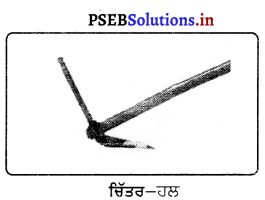
ਪ੍ਰਸ਼ਨ 6.
ਗੋਡੀ ਕਰਨ ਵਾਲੇ ਯੰਤਰਾਂ ਦਾ ਵਰਣਨ ਕਰੋ ।
ਉੱਤਰ-
ਗੋਡੀ ਕਰਨ ਵਾਲੇ ਯੰਤਰ ਹਨ-ਖੁਰ, ਕਸੌਲਾ, ਪਹੀਏਦਾਰ ਸੰਦ ਆਦਿ ।
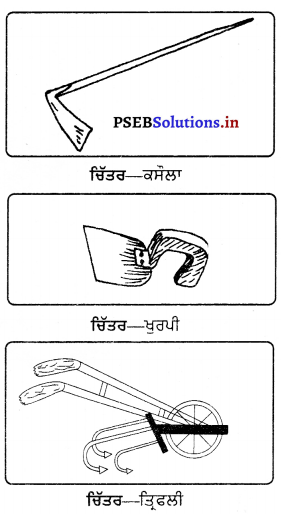
ਪਹੀਏਦਾਰ ਹੋ ਦੀ ਵਰਤੋਂ ਖੜੀ ਫ਼ਸਲ ਵਿਚ ਗੁਡਾਈ ਕਰਨ ਲਈ ਕੀਤੀ ਜਾਂਦੀ ਹੈ । ਇਸ ਨੂੰ ਇੱਕ ਆਦਮੀ ਹੱਥਾਂ ਨਾਲ ਪਿੱਛੋਂ ਧੱਕ ਕੇ ਚਲਾਉਂਦਾ ਹੈ । ਪਹੀਏ ਦੇ ਪਿੱਛੇ 3-6 ਫਾਲੇ ਲੱਗੇ ਹੁੰਦੇ ਹਨ ।
ਪ੍ਰਸ਼ਨ 7.
ਟਿੱਲਰ ਕਿਸ ਕੰਮ ਆਉਂਦਾ ਹੈ ?
ਉੱਤਰ-
ਇਸ ਦੀ ਵਰਤੋਂ ਖੇਤ ਦੀ ਵਾਹੀ ਕਰਨ ਲਈ ਕੀਤੀ ਜਾਂਦੀ ਹੈ । ਇਸ ਨਾਲ ਜ਼ਮੀਨ ਵਿਚ ਸਿਆੜ ਖੁੱਦਾ ਹੈ ਅਤੇ ਨੇੜੇ-ਨੇੜੇ ਸਿਆੜ ਕੱਢੇ ਜਾਂਦੇ ਹਨ । ਇਸ ਨਾਲ ਸਾਰੇ ਖੇਤ ਦੀ ਵਾਹੀ ਹੋ ਜਾਂਦੀ ਹੈ ।
ਪ੍ਰਸ਼ਨ 8.
ਡਿਸਕ ਹੈਰੋ ਕਿਸ ਕੰਮ ਆਉਂਦੀ ਹੈ ? ਉੱਤਰ-ਡਿਸਕ ਹੈਰੋ ਦੀ ਵਰਤੋਂ ਸਖ਼ਤ ਜ਼ਮੀਨ ਵਿਚ ਢੇਲਿਆਂ ਨੂੰ ਤੋੜਨ ਲਈ ਅਤੇ ਮਿੱਟੀ ਨੂੰ ਭੁਰਭੁਰਾ ਕਰਨ ਲਈ ਕੀਤੀ ਜਾਂਦੀ ਹੈ । ਅਜਿਹੀ ਜ਼ਮੀਨ ਜਿਸ ਵਿੱਚ ਵਧੇਰੇ ਘਾਹ ਫੂਸ ਹੋਵੇ ਜਾਂ ਪਹਿਲੀ ਫ਼ਸਲ ਦੀ ਰਹਿੰਦ-ਖੂੰਹਦ ਜਾਂ ਜੜਾਂ ਵੱਧ ਹੋਣ ਤਾਂ ਉਸ ਖੇਤ ਦੀ ਮੁੱਢਲੀ ਵਹਾਈ ਲਈ ਇਸ ਦੀ ਵਰਤੋਂ ਕੀਤੀ ਜਾਂਦੀ ਹੈ ।

ਪ੍ਰਸ਼ਨ 9.
ਹੈਪੀਸੀਡਰ ਕਿਵੇਂ ਕੰਮ ਕਰਦਾ ਹੈ ?
ਉੱਤਰ-
ਇਸ ਦੀ ਵਰਤੋਂ ਕਣਕ ਦੀ ਬਿਜਾਈ ਲਈ ਕੀਤੀ ਜਾਂਦੀ ਹੈ । ਜਦੋਂ ਝੋਨੇ ਦੀ ਵਾਢੀ ਤੋਂ ਬਾਅਦ ਪਰਾਲੀ ਖੇਤ ਵਿਚ ਹੀ ਹੁੰਦੀ ਹੈ ਤਾਂ ਇਸ ਨੂੰ ਕੱਢੇ ਬਿਨਾਂ ਹੀ ਕਣਕ ਦੀ ਸਿੱਧੀ ਬਿਜਾਈ ਖੇਤ ਵਿਚ ਕਰਨ ਲਈ ਹੈਪੀਸੀਡਰ ਦੀ ਵਰਤੋਂ ਹੁੰਦੀ ਹੈ । ਇਸ ਮਸ਼ੀਨ ਵਿਚ ਫਲੇਲ ਕਿਸਮ ਦੇ ਬਲੇਡ ਲੱਗੇ ਹੋਏ ਹਨ ਜੋ ਕਿ ਡਰਿੱਲ ਦੇ ਬਿਜਾਈ ਕਰਨ ਵਾਲੇ ਵਾਲੇ ਦੇ ਸਾਹਮਣੇ ਆਉਣ ਵਾਲੀ ਪਰਾਲੀ ਨੂੰ ਕੱਟਦੇ ਹਨ ਅਤੇ ਪਿੱਛੇ ਵਲ ਧੱਕਦੇ ਹਨ । ਮਸ਼ੀਨ ਦੇ ਵਾਲਿਆਂ ਵਿੱਚ ਪਰਾਲੀ ਨਹੀਂ ਛੱਸਦੀ ਅਤੇ ਸਾਫ਼ ਕੀਤੀ। ਕੱਟੀ ਹੋਈ ਜਗਾ ਉੱਪਰ ਬੀਜ ਠੀਕ ਢੰਗ ਨਾਲ ਪੋਰਿਆ ਜਾਂਦਾ ਹੈ ।
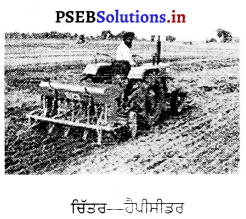

ਪ੍ਰਸ਼ਨ 10.
ਥਰੈਸ਼ਰ ਕਿੰਨੇ ਤਰ੍ਹਾਂ ਦੇ ਹੁੰਦੇ ਹਨ ?
ਉੱਤਰ-
ਥਰੈਸ਼ਰ ਕਈ ਤਰ੍ਹਾਂ ਦੇ ਹੁੰਦੇ ਹਨ ਤੇ ਗਹਾਈ ਦੇ ਕੰਮ ਆਉਂਦੇ ਹਨ । ਕੰਬਾਇਨ ਹਾਰਵੈਸਟਰ, ਇਹ ਸਵੈਚਾਲਿਤ ਕੰਬਾਇਨ ਹਾਰਵੈਸਟਰ ਅਤੇ ਟਰੈਕਟਰ ਨਾਲ ਚੱਲਣ ਵਾਲੇ ਕੰਬਾਇਨ ਹਾਰਵੈਸਟਰ ਹੁੰਦੇ ਹਨ ।
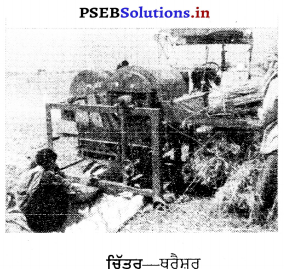
(ੲ) ਪੰਜ ਜਾਂ ਛੇ ਵਾਕਾਂ ਵਿੱਚ ਉੱਤਰ ਦਿਓ-
ਪ੍ਰਸ਼ਨ 1.
ਖੇਤੀ ਮਸ਼ੀਨ ਦਾ ਆਧੁਨਿਕ ਯੁੱਗ ਵਿਚ ਕੀ ਮਹੱਤਵ ਹੈ ?
ਉੱਤਰ-
ਖੇਤੀ ਦੀ ਪਹਿਲੀ ਤੇ ਮੁੱਢਲੀ ਮੰਗ ਉਰਜਾ ਅਤੇ ਸ਼ਕਤੀ ਹੈ । ਪ੍ਰਾਚੀਨ ਸਮੇਂ ਵਿੱਚ ਖੇਤੀ ਨਾਲ ਸੰਬੰਧਿਤ ਕਾਰਜ ਜਿਵੇਂ ਕਟਾਈ, ਗਹਾਈ, ਸਫ਼ਾਈ, ਭੰਡਾਰਨ, ਢੋ-ਢੁਆਈ ਆਦਿ ਵਿਚ ਪਸ਼ੂਆਂ ਜਿਵੇਂ ਬਲਦ, ਉਠ ਅਤੇ ਖੱਚਰ ਆਦਿ ਦੀ ਵਰਤੋਂ ਕੀਤੀ ਜਾਂਦੀ ਹੈ । ਪਰ ਇਸ ਢੰਗ ਨਾਲ ਖੇਤੀ ਦੇ ਕੰਮ ਪੂਰੇ ਹੋਣ ਲਈ ਕਿੰਨੇ ਹੀ ਦਿਨ ਲੱਗ ਜਾਂਦੇ ਸਨ । ਵੱਧਦੀ ਹੋਈ ਜਨਸੰਖਿਆ ਨਾਲ ਖੇਤੀ ਉਤਪਾਦਾਂ ਦੀ ਮੰਗ ਵੀ ਵੱਧ ਗਈ ਹੈ ਤੇ ਇਸ ਲਈ ਖੇਤੀ ਨਾਲ ਸੰਬੰਧਿਤ ਕਾਰਜਾਂ ਲਈ ਮਸ਼ੀਨਾਂ ਦੀ ਵਰਤੋਂ ਹੋਣ ਲੱਗ ਪਈ ਹੈ । ਅੱਜ ਦੇ ਯੁੱਗ ਵਿੱਚ ਖੇਤੀ ਮਸ਼ੀਨਾਂ ਦਾ ਮਹੱਤਵ ਬਹੁਤ ਵੱਧ ਗਿਆ ਹੈ । ਇਨ੍ਹਾਂ ਦੀ ਵਰਤੋਂ ਨਾਲ ਉਪਜ ਵਿਚ ਵਾਧਾ ਹੋਇਆ ਹੈ । ਉਪਜ ਦੀ ਕਟਾਈ, ਗਹਾਈ, ਗੋਡਾਈ ਆਦਿ ਸਾਰੇ ਕੰਮ ਜਲਦੀ-ਜਲਦੀ ਹੋ ਜਾਂਦੇ ਹਨ ।
ਪ੍ਰਸ਼ਨ 2.
ਉਲਟਾਵਾਂ ਹਲ ਕੀ ਹੈ ? ਇਹ ਦੂਜੇ ਹਲਾਂ ਨਾਲੋਂ ਕਿਵੇਂ ਭਿੰਨ ਹੈ ?
ਉੱਤਰ-

ਇਹ ਹਲ ਮਿੱਟੀ ਨੂੰ ਉਲਟਾਉਣ ਦੇ ਕੰਮ ਆਉਂਦਾ ਹੈ । ਮਿੱਟੀ ਦੀ ਹੇਠਲੀ ਤਹਿ ਉੱਪਰ ਤੇ ਉੱਪਰਲੀ . ਤਹਿ ਹੇਠਾਂ ਚਲੀ ਜਾਂਦੀ ਹੈ । ਇਹ ਹਲ ਲੋਹੇ ਦਾ ਬਣਿਆ ਹੁੰਦਾ ਹੈ । ਜੇ ਪਹਿਲੀ ਫ਼ਸਲ ਵੱਢਣ ਅਤੇ ਦੂਜੀ ਫ਼ਸਲ ਬੀਜਣ ਵਿੱਚ ਕੁਝ ਸਮਾਂ ਬਚਦਾ ਹੋਵੇ ਤਾਂ ਉਲਟਾਂਵੇਂ ਹਲ ਦੀ ਵਰਤੋਂ ਬਹੁਤ ਲਾਭਦਾਇਕ ਸਿੱਧ ਹੁੰਦੀ ਹੈ । ਇਸ ਦੀ ਵਰਤੋਂ ਨਾਲ ਜ਼ਮੀਨ ਉੱਪਰਲਾ ਘਾਹ-ਫੁਸ ਹੇਠਾਂ ਚਲਾ ਜਾਂਦਾ ਹੈ ਅਤੇ ਗੱਲਸੜ ਕੇ ਖਾਦ ਦਾ ਕੰਮ ਕਰਦਾ ਹੈ । ਜ਼ਮੀਨ ਹੇਠਲੀਆਂ ਜੜ੍ਹਾਂ ਅਤੇ ਹੋਰ ਘਾਹ-ਫੂਸ ਉੱਪਰ ਆ ਜਾਦਾ ਹੈ ਅਤੇ ਜ਼ਮੀਨ ਵਿਚਲੇ ਹਾਨੀਕਾਰਕ ਜੀਵਾਣੂ ਧੁੱਪ ਨਾਲ ਖ਼ਤਮ ਹੋ ਜਾਂਦੇ ਹਨ ।
| ਉਲਟਾਂਵਾਂ ਹਲ |
ਹਲ ਜਾਂ ਟਿੱਲਰ |
| 1. ਇਹ ਹਲ ਲੋਹੇ ਦਾ ਬਣਿਆ ਹੁੰਦਾ ਹੈ । |
1. ਇਹ ਹਲ ਲੱਕੜ ਦਾ ਬਣਿਆ ਹੁੰਦਾ ਹੈ । ਜਿਸਦੇ ਅੱਗੇ ਲੋਹੇ ਦਾ ਫਾਲਾ ਲੱਗਾ ਹੁੰਦਾ ਹੈ । |
| 2. ਇਸ ਨਾਲ ਉੱਪਰਲੀ ਮਿੱਟੀ ਹੇਠਾਂ ਤੇ ਹੇਠਲੀ ਮਿੱਟੀ ਉੱਪਰ ਆ ਜਾਂਦੀ ਹੈ । |
2. ਇਸ ਨਾਲ ਸਿਆੜ ਖੁੱਲ੍ਹਦਾ ਹੈ । |
ਪ੍ਰਸ਼ਨ 3.
ਪਰਾਲੀ ਸਾਂਭਣ ਵਾਲੀਆਂ ਮਸ਼ੀਨਾਂ ਦਾ ਵਰਣਨ ਕਰੋ !
ਉੱਤਰ-
ਬੇਲਰ ਪਰਾਲੀ ਸਾਂਭਣ ਵਾਲੀ ਮਸ਼ੀਨ ਹੈ । ਇਸ ਦੀ ਸਹਾਇਤਾ ਨਾਲ ਪਰਾਲੀ ਇਕੱਠੀ ਕਰਕੇ ਚੌਰਸ ਜਾਂ ਗੋਲ ਪਲੇ ਬੰਨ੍ਹ ਦਿੱਤੇ ਹਨ । ਇਹ ਮਸ਼ੀਨ ਖੇਤ ਵਿਚ ਖਿਲਰੀ ਪਰਾਲੀ ਨੂੰ ਇਕੱਠਾ ਕਰਕੇ ਇੱਕ ਸਾਰ ਗੰਢਾਂ ਬਣਾਉਣ ਦੇ ਕੰਮ ਆਉਂਦੀ ਹੈ । ਇਹ ਮਸ਼ੀਨ ਕੇਵਲ ਕੱਟੀ ਹੋਈ ਪਰਾਲੀ ਨੂੰ ਹੀ ਇਕੱਠਾ ਕਰਦੀ ਹੈ ।
ਹੈਪੀਸੀਡਰ – ਇਸ ਮਸ਼ੀਨ ਦੀ ਵਰਤੋਂ ਝੋਨੇ ਦੀ ਵਾਢੀ ਪਿੱਛੋਂ ਪਰਾਲੀ ਨੂੰ ਖੇਤ ਵਿਚੋਂ ਕੱਢੇ ਬਿਨਾਂ ਕਣਕ ਦੀ ਸਿੱਧੀ ਬਿਜਾਈ ਲਈ ਕੀਤੀ ਜਾਂਦੀ ਹੈ ।
ਪਰਾਲੀ ਚੋਪਰ – ਪਰਾਲੀ ਨੂੰ ਖੇਤਾਂ ਵਿਚ ਹੀ ਵਾਹੁਣ ਲਈ ਇਸ ਮਸ਼ੀਨ ਦੀ ਵਰਤੋਂ ਹੁੰਦੀ ਹੈ । ਇਸ ਦੀ ਵਰਤੋਂ ਨਾਲ ਝੋਨੇ ਦੀ ਪਰਾਲੀ ਦਾ ਕੁਤਰਾ ਹੋ ਜਾਂਦਾ ਹੈ ਤੇ ਖੇਤਾਂ ਵਿਚ ਖਿਲਾਰ ਦਿੱਤੀ ਜਾਂਦੀ ਹੈ । ਕੁਤਰਾ ਕੀਤੇ ਖੇਤ ਵਿਚ ਪਾਣੀ ਲਾ ਕੇ ਰੋਟਰੀ ਪੱਡਲਰ ਰੋਟਾਵੇਟਰ) ਦੀ ਸਹਾਇਤਾ ਨਾਲ ਪਰਾਲੀ ਨੂੰ ਖੇਤ ਵਿਚ ਮਿਲਾ ਦਿੱਤਾ ਜਾਂਦਾ ਹੈ ।

ਪ੍ਰਸ਼ਨ 4.
ਬਿਜਾਈ ਲਈ ਮੁੱਖ ਕਿਹੜੀਆਂ ਮਸ਼ੀਨਾਂ ਵਰਤੀਆਂ ਜਾਂਦੀਆਂ ਹਨ ?
ਉੱਤਰ-
ਬਿਜਾਈ ਲਈ ਮੁੱਖ ਤੌਰ ਤੇ ਬੀਜ ਅਤੇ ਖਾਦ ਡਰਿਲਾਂ ਅਤੇ ਵਾਂਸਪਲਾਂਟਰ ਦੀ ਵਰਤੋਂ ਹੁੰਦੀ ਹੈ ।
ਬੀਜ ਅਤੇ ਖਾਦ ਡਰਿਲ ਦੀ ਵਰਤੋਂ ਕਰਕੇ ਕਣਕ, ਛੋਲੇ, ਸਰੋਂ, ਬਾਜਰਾ, ਮੂੰਗੀ, ਜਵਾਰ ਆਦਿ ਦੀ ਬਿਜਾਈ ਕੀਤੀ ਜਾਂਦੀ ਹੈ ! ਵਾਂਸਪਲਾਂਟਰ ਦੁਆਰਾ ਝੋਨੇ ਦੀ ਬਿਜਾਈ ਹੁੰਦੀ ਹੈ ।
ਜ਼ੀਰੋ ਟਿਲ ਡਰਿਲ ਅਤੇ ਬੈਡ ਪਲਾਂਟਰ ਦੀ ਵਰਤੋਂ ਕਣਕ ਦੀ ਬਿਜਾਈ ਲਈ ਹੁੰਦੀ ਹੈ ।
ਕਾਟਨ ਪਲਾਂਟਰ ਦੀ ਵਰਤੋਂ ਨਰਮੇ ਅਤੇ ਕਪਾਹ ਦੀ ਬਿਜਾਈ ਲਈ ਹੁੰਦੀ ਹੈ । ਆਲੂ ਦੀ ਬਿਜਾਈ ਲਈ ਪਟੈਟੋ ਪਲਾਂਟਰ ਦੀ ਵਰਤੋਂ ਹੁੰਦੀ ਹੈ ।
ਗੰਨੇ ਦੀ ਬਿਜਾਈ ਲਈ ਸ਼ੁਗਰਕੈਨ ਪਲਾਂਟਰ ਦੀ ਵਰਤੋਂ ਹੁੰਦੀ ਹੈ । ਵੱਖ-ਵੱਖ ਸਬਜ਼ੀਆਂ ਲਈ ਵੈਜ਼ੀਟੇਬਲ ਪਲਾਂਟਰਾਂ ਦੀ ਵਰਤੋਂ ਹੁੰਦੀ ਹੈ ।
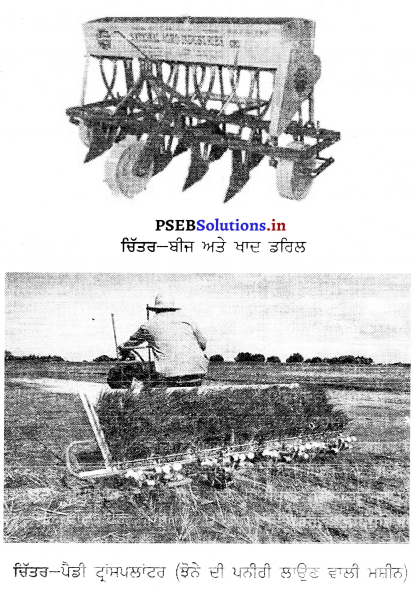
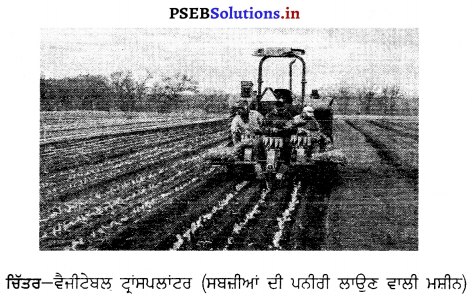

ਪ੍ਰਸ਼ਨ 5.
ਕੰਬਾਈਨ ਹਾਰਵੈਸਟਰ ਮਸ਼ੀਨ ਦੇ ਮੁੱਖ ਕੰਮਾਂ ਦਾ ਵਰਣਨ ਕਰੋ ।
ਉੱਤਰ-
- ਇਸ ਦੀ ਵਰਤੋਂ ਫ਼ਸਲ ਦੀ ਵਾਢੀ ਲਈ ਹੁੰਦੀ ਹੈ ।
- ਫ਼ਸਲ ਦੀ ਗਹਾਈ (ਦਾਣੇ ਕੱਢਣ) ਲਈ ਹੁੰਦੀ ਹੈ ।
- ਫ਼ਸਲ ਦੀ ਸਫ਼ਾਈ ਲਈ ਹੁੰਦੀ ਹੈ ।
- ਫ਼ਸਲ ਨੂੰ ਇਕੱਠਾ ਕਰਨਾ ਸੰਭਵ ਹੈ ।
- ਇਸ ਨਾਲ ਸਮੇਂ ਦੀ ਬੱਚਤ ਹੁੰਦੀ ਹੈ ।
- ਦਾਣੇ ਜਲਦੀ ਨਿਕਲ ਜਾਂਦੇ ਹਨ ਤੇ ਅੱਗ, ਮੀਂਹ, ਤੁਫ਼ਾਨ ਤੋਂ ਹਾਨੀ ਦਾ ਡਰ ਨਹੀਂ ਰਹਿੰਦਾ ।

PSEB 6th Class Agriculture Guide ਖੇਤੀ ਸੰਦ ਅਤੇ ਮਸ਼ੀਨਾਂ Important Questions and Answers
ਵਸਤੂਨਿਸ਼ਠ ਪ੍ਰਸ਼ਨ
ਬਹੁ-ਵਿਕਲਪੀ ਪ੍ਰਸ਼ਨ
ਪ੍ਰਸ਼ਨ 1.
ਟਰੈਕਟਰ ਦੀ ਹਾਰਸ ਪਾਵਰ ………………… ਹੈ ।
(i) 2
(ii) 5-90
(iii) 1000
(iv) ਕੋਈ ਨਹੀਂ ।
ਉੱਤਰ-
(ii) 5-90.
ਪ੍ਰਸ਼ਨ 2.
ਪੰਜਾਬ ਵਿਚ ਕਿੰਨੇ ਟਰੈਕਟਰ ਹਨ ?
(i) 2 ਲੱਖ
(ii) 10 ਲੱਖ
(iii) 4.76 ਲੱਖ
(iv) 7.46 ਲੱਖ ।
ਉੱਤਰ-
(iii) 4.76 ਲੱਖ ।
ਪ੍ਰਸ਼ਨ 3.
ਪੰਜਾਬ ਵਿਚ ………………. ਟਿਊਬਵੈੱਲ ਬਿਜਲੀ ਨਾਲ ਚੱਲਦੇ ਹਨ ।
(i) 11.5 ਲੱਖ
(ii) 15 ਲੱਖ
(iii) 17.9 ਲੱਖ ।
(iv) 13.17 ਲੱਖ ।
ਉੱਤਰ-
(i) 11.5 ਲੱਖ ।
ਪ੍ਰਸ਼ਨ 4.
ਜਿੰਦਰਾ …………………… ਕੰਮ ਆਉਂਦਾ ਹੈ ।
(i) ਵਾਹੀ ਦੇ
(ii) ਵੱਟਾਂ ਪਾਉਣ ਦੇ
(iii) ਪੱਧਰਾ ਕਰਨ ਦੇ
(iv) ਬਿਜਾਈ ਦੇ ।
ਉੱਤਰ-
(ii) ਵੱਟਾਂ ਪਾਉਣ ਦੇ ।

ਖ਼ਾਲੀ ਥਾਂ ਭਰੋ
(i) ਸੁਹਾਗਾ ਜ਼ਮੀਨ ਨੂੰ ……………………. ਅਤੇ ……………… ਕਰਦਾ ਹੈ ।
ਉੱਤਰ-
ਪੱਧਰਾ, ਭੁਰਭੁਰਾ
(ii) ਕਲਟੀਵੇਟਰ ਦੀ ਵਰਤੋਂ ਤਵੀਆਂ ਤੋਂ ਬਾਅਦ …………………… ਵਹਾਈ ਲਈ ਕੀਤੀ ਜਾਂਦੀ ਹੈ ।
ਉੱਤਰ-
ਦੂਜੀ
(iii) ਟਰਾਂਸਪਲਾਂਟਰ ਦੁਆਰਾ ……………………. ਦੀ ਬਿਜਾਈ ਹੁੰਦੀ ਹੈ ।
ਉੱਤਰ-
ਝੋਨੇ
(iv) ਖੁਰਪੀ ਨਾਲ ………………………… ਕੀਤੀ ਜਾਂਦੀ ਹੈ ।
ਉੱਤਰ-
ਗੁਡਾਈ
(v) ਰੀਪਰ ਦੀ ਵਰਤੋਂ …………………….. ਲਈ ਹੁੰਦੀ ਹੈ ।
ਉੱਤਰ-
ਵਾਢੀ ।
ਠੀਕ/ਗਲਤ-
(i) ਟਰਾਂਸਪਲਾਂਟਰ ਦੀ ਵਰਤੋਂ ਝੋਨੇ ਦੀ ਬਿਜਾਈ ਲਈ ਹੁੰਦੀ ਹੈ ।
(ii) ਜਿੰਦਰੇ ਦੀ ਵਰਤੋਂ ਖੇਤ ਵਿਚ ਵੱਟਾਂ ਪਾਉਣ ਲਈ ਹੁੰਦੀ ਹੈ ।
(iii) ਡੀਜ਼ਲ ਇੰਜਣ ਟਰੈਕਟਰ ਤੋਂ ਵੱਡੀ ਮਸ਼ੀਨ ਹੁੰਦੀ ਹੈ ।
ਉੱਤਰ-
(i) ਠੀਕ,
(ii) ਠੀਕ,
(iii) ਗ਼ਲਤ ।

ਬਹੁਤ ਛੋਟੇ ਉੱਤਰਾਂ ਵਾਲੇ ਪ੍ਰਸ਼ਨ
ਪ੍ਰਸ਼ਨ 1.
ਖੇਤੀ ਦੀ ਪਹਿਲੀ ਮੰਗ ਕੀ ਹੈ ?
ਉੱਤਰ-
ਊਰਜਾ ਅਤੇ ਸ਼ਕਤੀ ।
ਪ੍ਰਸ਼ਨ 2.
ਟਰੈਕਟਰ ਕਿੰਨੀ ਸ਼ਕਤੀ ਵਾਲੇ ਹੁੰਦੇ ਹਨ ?
ਉੱਤਰ-
5 ਹਾਰਸ ਪਾਵਰ ਤੋਂ 90 ਹਾਰਸ ਪਾਵਰ ਤੱਕ ।
ਪ੍ਰਸ਼ਨ 3.
ਪੰਜਾਬ ਵਿੱਚ ਕਿੰਨੇ ਟਰੈਕਟਰ ਹਨ ?
ਉੱਤਰ-
4.76 ਲੱਖ ।
ਪ੍ਰਸ਼ਨ 4.
ਜ਼ਮੀਨ ਦੀ ਵਾਹੀ ਲਈ ਕਿਹੜਾ ਸੰਦ ਹੈ ?
ਉੱਤਰ-
ਹਲ ਜਾਂ ਟਿੱਲਰ ।
ਪ੍ਰਸ਼ਨ 5.
ਸਖ਼ਤ ਜ਼ਮੀਨ ਵਿਚ ਢੇਲਿਆਂ ਨੂੰ ਤੋੜਨ ਲਈ ਕਿਸ ਦੀ ਵਰਤੋਂ ਹੁੰਦੀ ਹੈ ?
ਉੱਤਰ-
ਡਿਸਕ ਹੈਰੋ (ਤਵੀਆਂ) ।
ਪ੍ਰਸ਼ਨ 6.
ਉਲਟਾਵਾਂ ਹਲ ਕਿਸ ਦਾ ਬਣਿਆ ਹੁੰਦਾ ਹੈ ?
ਉੱਤਰ-
ਲੋਹੇ ਦਾ ।

ਪ੍ਰਸ਼ਨ 7.
ਬਲਦਾਂ ਨਾਲ ਕਿੰਨੇ ਉਲਟਾਵੇਂ ਹਲ ਖਿੱਚੇ ਜਾ ਸਕਦੇ ਹਨ ?
ਉੱਤਰ-
ਇੱਕ ਹਲ ।
ਪ੍ਰਸ਼ਨ 8.
ਟਰੈਕਟਰ ਨਾਲ ਕਿੰਨੇ ਉਲਟਾਵੇਂ ਹਲ ਚਲਾਏ ਜਾ ਸਕਦੇ ਹਨ ?
ਉੱਤਰ-
4 ਤੋਂ 6 ਹਲ ।
ਪ੍ਰਸ਼ਨ 9.
ਸੁਹਾਗਾ ਕਿੰਨਾ ਚੌੜਾ ਅਤੇ ਮੋਟਾ ਹੁੰਦਾ ਹੈ ?
ਉੱਤਰ-
8 ਇੰਚ ਚੌੜਾ ਅਤੇ 3 ਇੰਚ ਮੋਟਾ ।
ਪ੍ਰਸ਼ਨ 10.
ਟਰੈਕਟਰ ਨਾਲ ਚੱਲਣ ਵਾਲੇ ਸੁਹਾਗੇ ਦੀ ਲੰਬਾਈ ਕਿੰਨੇ ਫੁੱਟ ਹੁੰਦੀ ਹੈ ?
ਉੱਤਰ-
10 ਫੁੱਟ ।
ਪ੍ਰਸ਼ਨ 11.
ਬਲਦਾਂ ਨਾਲ ਚੱਲਣ ਵਾਲੇ ਸੁਹਾਗੇ ਦੀ ਲੰਬਾਈ ਕਿੰਨੀ ਹੁੰਦੀ ਹੈ ?
ਉੱਤਰ-
6 ਫੁੱਟ ਲੰਬੀ ।
ਪ੍ਰਸ਼ਨ 12.
ਖੇਤ ਵਿੱਚ ਵੱਟਾਂ ਪਾਉਣ ਲਈ ਕਿਹੜਾ ਸੰਦ ਵਰਤਿਆ ਜਾਂਦਾ ਹੈ ?
ਉੱਤਰ-
ਜ਼ਿੰਦਰਾ ।

ਪ੍ਰਸ਼ਨ 13.
ਤਵੇਦਾਰ ਹਲ ਵਿਚ ਤਵੀਆਂ ਦੀ ਸੰਖਿਆ ਕਿੰਨੀ ਹੁੰਦੀ ਹੈ ?
ਉੱਤਰ-
1 ਤੋਂ 6.
ਪ੍ਰਸ਼ਨ 14.
ਦੂਜੀ ਵਹਾਈ ਲਈ ਕਿਸ ਸੰਦ ਦੀ ਵਰਤੋਂ ਕੀਤੀ ਜਾਂਦੀ ਹੈ ?
ਉੱਤਰ-
ਕਲਟੀਵੇਟਰ ਦੀ ।
ਪ੍ਰਸ਼ਨ 15.
ਰੋਟਾਵੇਟਰ ਮਿੱਟੀ ਨੂੰ ਕਿਸ ਤਰ੍ਹਾਂ ਦਾ ਬਣਾਉਂਦਾ ਹੈ ?
ਉੱਤਰ-
ਭੁਰਭੁਰਾ ।
ਪ੍ਰਸ਼ਨ 16.
ਲੇਜ਼ਰ ਲੈਂਡ ਲੈਵਲਰ ਕਿਸ ਕੰਮ ਆਉਂਦਾ ਹੈ ?
ਉੱਤਰ-
ਜ਼ਮੀਨ ਨੂੰ ਪੱਧਰਾ ਕਰਨ ਲਈ ।
ਪ੍ਰਸ਼ਨ 17.
ਝੋਨੇ ਦੀ ਬਿਜਾਈ ਕਿਸ ਮਸ਼ੀਨ ਨਾਲ ਹੁੰਦੀ ਹੈ ?
ਉੱਤਰ-
ਸਪਲਾਂਟਰ ਨਾਲ ।
ਪ੍ਰਸ਼ਨ 18.
ਗੰਨੇ ਦੀ ਬਿਜਾਈ ਲਈ ਮਸ਼ੀਨ ਦਾ ਨਾਂ ਦੱਸੋ ।
ਉੱਤਰ-
ਸ਼ੂਗਰਕੇ ਪਲਾਂਟਰ ।

ਪ੍ਰਸ਼ਨ 19.
ਜ਼ੀਰੋ ਟਿਲ ਡਰਿਲ ਮਸ਼ੀਨ ਨਾਲ ਇੱਕ ਘੰਟੇ ਵਿਚ ਕਿੰਨੀ ਬਿਜਾਈ ਕੀਤੀ ਜਾ ਸਕਦੀ ਹੈ ?
ਉੱਤਰ-
ਇੱਕ ਏਕੜ ।
ਪ੍ਰਸ਼ਨ 20.
ਕੀ ਰੋਟੋ ਟਿਲ ਡਰਿੱਲ ਦੀ ਵਰਤੋਂ ਤੋਂ ਪਹਿਲਾਂ ਵਹਾਈ ਦੀ ਲੋੜ ਹੁੰਦੀ ਹੈ ?
ਉੱਤਰ-
ਨਹੀਂ ਹੁੰਦੀ ਹੈ ।
ਪ੍ਰਸ਼ਨ 21.
ਗੋਡੀ ਕਰਨ ਲਈ ਆਮ ਵਰਤੇ ਜਾਂਦੇ ਸੰਦ ਕਿਹੜੇ ਹਨ ?
ਉੱਤਰ-
ਖੁਰਪਾ, ਕਸੌਲਾ ।
ਪ੍ਰਸ਼ਨ 22.
ਕਤਾਰਾਂ ਵਿਚ ਬੀਜੀਆਂ ਫ਼ਸਲਾਂ ਦੀ ਗੋਡੀ ਲਈ ਸੰਦ ਦਾ ਨਾਂ ਦੱਸੋ ।
ਉੱਤਰ-
ਤਿਰਫਾਲੀ ।
ਪ੍ਰਸ਼ਨ 23.
ਖੜ੍ਹੀ ਫ਼ਸਲ ਵਿਚ ਗੁਡਾਈ ਕਰਨ ਵਾਲਾ ਸੰਦ ਕਿਹੜਾ ਹੈ ?
ਉੱਤਰ-
ਪਹੀਏਦਾਰ ਹੋ ।
ਪ੍ਰਸ਼ਨ 24.
ਪਹੀਏਦਾਰ ਹੋ ਦੇ ਪਿੱਛੇ ਕਿੰਨੇ ਫਾਲੇ ਲੱਗੇ ਹੁੰਦੇ ਹਨ ?
ਉੱਤਰ-
3-6 ਫਾਲੇ ।

ਪ੍ਰਸ਼ਨ 25.
ਇੰਜਣ ਨਾਲ ਚੱਲਣ ਵਾਲਾ ਸਪੇਅਰ ਕਿਹੜਾ ਹੈ ?
ਉੱਤਰ-
ਹੇਰੋ ਬਲਾਸਟ ਸਪ੍ਰੇਅਰ ।
ਪ੍ਰਸ਼ਨ 26.
ਰੀਪਰ ਦੀ ਵਰਤੋਂ ਕਿਸ ਕੰਮ ਲਈ ਹੁੰਦੀ ਹੈ ?
ਉੱਤਰ-
ਵਾਢੀ ਲਈ ।
ਪ੍ਰਸ਼ਨ 27.
ਥਰੈਸ਼ਰ ਦਾ ਮੁੱਖ ਕੰਮ ਕੀ ਹੈ ?
ਉੱਤਰ-
ਫ਼ਸਲਾਂ ਵਿਚੋਂ ਦਾਣੇ ਕੱਢਣਾ ।
ਪ੍ਰਸ਼ਨ 28.
ਪਰਾਲੀ ਨੂੰ ਖੇਤ ਵਿਚ ਇਕੱਠਾ ਕਰਨ ਲਈ ਕਿਹੜੀ ਮਸ਼ੀਨ ਦੀ ਵਰਤੋਂ ਕੀਤੀ ਜਾਂਦੀ ਹੈ ?
ਉੱਤਰ-
ਬੇਲਰ ਦੀ ।
ਪ੍ਰਸ਼ਨ 29.
ਹੈਪੀਸੀਡਰ ਕਿੰਨੇ ਹਾਰਸ ਪਾਵਰ ਵਾਲੇ ਟਰੈਕਟਰ ਨਾਲ ਚਲਦੀ ਹੈ ?
ਉੱਤਰ-
45-50 ਹਾਰਸ ਪਾਵਰ ਵਾਲੇ ।
ਪ੍ਰਸ਼ਨ 30.
ਪਰਾਲੀ ਨੂੰ ਖੇਤਾਂ ਵਿੱਚ ਵਾਹੁਣ ਲਈ ਕਿਹੜੀ ਮਸ਼ੀਨ ਦੀ ਵਰਤੋਂ ਹੁੰਦੀ ਹੈ ?
ਉੱਤਰ-
ਪਰਾਲੀ ਚੌਪਰ ।

ਪ੍ਰਸ਼ਨ 31.
ਭਾਂ ਦੀ ਗੋਡਾਈ ਕਿਉਂ ਕੀਤੀ ਜਾਂਦੀ ਹੈ ?
ਉੱਤਰ-
ਗੋਡਾਈ ਕਰਨ ਨਾਲ ਵਾਧੂ ਜੜ੍ਹੀ-ਬੂਟੀ ਨਸ਼ਟ ਹੋ ਜਾਂਦੀ ਹੈ ।
ਪ੍ਰਸ਼ਨ 32.
ਮਿੱਟੀ ਪਲਟ ਹਲ ਨਾਲ ਸਮਾਂ, ਧਨ ਅਤੇ ਮਿਹਨਤ ਦੀ ਬੱਚਤ ਕਿਵੇਂ ਹੁੰਦੀ ਹੈ ?
ਉੱਤਰ-
ਇਹ ਹਲ ਤੋਂ ਨੂੰ ਕੇਵਲ ਕੱਟਦਾ ਹੀ ਨਹੀਂ ਸਗੋਂ ਮਿੱਟੀ ਵੀ ਪਲਟ ਦਿੰਦਾ ਹੈ ਇਸ ਤਰ੍ਹਾਂ ਸਮੇਂ, ਧਨ ਅਤੇ ਮਿਹਨਤ ਦੀ ਬੱਚਤ ਹੋ ਜਾਂਦੀ ਹੈ ।
ਪ੍ਰਸ਼ਨ 33.
ਹੈਰੋ ਦਾ ਕੀ ਮਹੱਤਵ ਹੈ ?
ਉੱਤਰ-
ਇਹ ਨਦੀਨਾਂ ਨੂੰ ਪੁੱਟ ਕੇ ਇਕੱਠੇ ਕਰ ਦਿੰਦਾ ਹੈ ਅਤੇ ਮਿੱਟੀ ਦੇ ਢੇਲਿਆਂ ਨੂੰ ਤੋੜ ਕੇ ਮਿੱਟੀ ਨੂੰ ਭੁਰਭੁਰੀ ਕਰ ਦਿੰਦਾ ਹੈ ।
ਪ੍ਰਸ਼ਨ 34.
ਦੇਸੀ ਹਲ ਕਿਸ ਤਰ੍ਹਾਂ ਦੇ ਸਿਆੜ ਬਣਾਉਂਦਾ ਹੈ ?
ਉੱਤਰ-
ਇਹ ਅੰਗਰੇਜ਼ੀ ਦੇ ਅੱਖ਼ਰ V ਆਕਾਰ ਦੇ ਸਿਆੜ ਬਣਾਉਂਦਾ ਹੈ ।
ਪ੍ਰਸ਼ਨ 35.
ਪਿਛਲੀ ਦਾਤਰੀ ਕਿਸ ਕੰਮ ਆਉਂਦੀ ਹੈ ?
ਉੱਤਰ-
ਇਸ ਨਾਲ ਗੰਨੇ ਦੀ ਛਿਲਾਈ ਕੀਤੀ ਜਾਂਦੀ ਹੈ ।
ਪ੍ਰਸ਼ਨ 36.
ਸੁਹਾਗਾ ਅਤੇ ਕਰਾਹਾ ਵਿਚ ਕੀ ਅੰਤਰ ਹੈ ?
ਉੱਤਰ-
ਸੁਹਾਗਾ ਹਲ ਵਾਹੁਣ ਮਗਰੋਂ ਭਾਂ ਨੂੰ ਪੱਧਰਾ ਕਰਨ ਲਈ ਵਰਤਿਆ ਜਾਂਦਾ ਹੈ । ਜਦਕਿ ਕਰਾਹਾ ਉੱਚੀ ਨੀਵੀਂ ਜ਼ਮੀਨ ਨੂੰ ਪੱਧਰਾ ਕਰਨ ਲਈ ਵਰਤਿਆ ਜਾਂਦਾ ਹੈ ।

ਪ੍ਰਸ਼ਨ 37.
ਭਾਰਤ ਵਿਚ ਕਿੰਨੀ ਕਿਸਮ ਦੇ ਹਲ ਪ੍ਰਚੱਲਿਤ ਹਨ ?
ਉੱਤਰ-
40 ਤਰ੍ਹਾਂ ਦੇ ।
ਪ੍ਰਸ਼ਨ 38.
ਪੰਜਾਬ ਵਿਚ ਕਿਹੜੇ ਹਲ ਵਰਤੋਂ ਵਿਚ ਆਉਂਦੇ ਹਨ ?
ਉੱਤਰ-
ਦੋ ਤਰ੍ਹਾਂ ਦੇ ਮੁੰਨਾ ਹਲ ਅਤੇ ਮਿੱਟੀ ਪਲਟ ਹਲ ।
ਪ੍ਰਸ਼ਨ 39.
ਡੀਜ਼ਲ ਇੰਜਣ ਨਾਲ ਕਿਹੜੀਆਂ ਮਸ਼ੀਨਾਂ ਚਲਾਈਆਂ ਜਾਂਦੀਆਂ ਹਨ ?
ਉੱਤਰ-
ਇਸ ਨਾਲ ਟਿਊਬਵੈੱਲ, ਪੱਠੇ ਕੁਤਰਨ ਲਈ ਮਸ਼ੀਨ ਅਤੇ ਦਾਣੇ ਕੱਢਣ ਵਾਲੀਆਂ ਮਸ਼ੀਨਾਂ ਚਲਾਈਆਂ ਜਾਂਦੀਆਂ ਹਨ ।
ਪ੍ਰਸ਼ਨ 40.
ਟਰੈਕਟਰ ਨਾਲ ਚੱਲਣ ਵਾਲੇ ਸੁਹਾਗੇ ਦੀ ਲੰਬਾਈ ਕਿੰਨੀ ਹੁੰਦੀ ਹੈ ?
ਉੱਤਰ-
ਇਸ ਦੀ ਲੰਬਾਈ 10 ਫੁੱਟ ਹੁੰਦੀ ਹੈ ।
ਪ੍ਰਸ਼ਨ 41.
ਬਲਦਾਂ ਨਾਲ ਚੱਲਣ ਵਾਲੇ ਸੁਹਾਗੇ ਦੀ ਲੰਬਾਈ ਕਿੰਨੀ ਹੁੰਦੀ ਹੈ ?
ਉੱਤਰ-
ਇਸ ਦੀ ਲੰਬਾਈ 6 ਫੁੱਟ ਹੁੰਦੀ ਹੈ ।
ਪ੍ਰਸ਼ਨ 42
ਡੀਜ਼ਲ ਇੰਜਣ ਦੀ ਵਰਤੋਂ ਨੂੰ ਪਹਿਲ ਕਦੋਂ ਦੇਣੀ ਚਾਹੀਦੀ ਹੈ ?
ਉੱਤਰ-
ਜਦੋਂ ਘੱਟ ਸ਼ਕਤੀ ਦੀ ਵਰਤੋਂ ਦੀ ਲੋੜ ਹੋਵੇ ਉੱਥੇ ਟਰੈਕਟਰ ਦੀ ਥਾਂ ਡੀਜ਼ਲ ਇੰਜਣ ਦੀ ਵਰਤੋਂ ਨੂੰ ਪਹਿਲ ਦੇਣੀ ਚਾਹੀਦੀ ਹੈ ।

ਪ੍ਰਸ਼ਨ 43.
ਪੰਜਾਬ ਵਿੱਚ ਕਿੰਨੇ ਟਿਊਬਵੈੱਲ ਬਿਜਲੀ ਨਾਲ ਚਲਾਏ ਜਾਂਦੇ ਹਨ ?
ਉੱਤਰ-
11.5 ਲੱਖ ।
ਪ੍ਰਸ਼ਨ 44.
ਡਿਸਕ ਹੈਰੋ ਨੂੰ ਦੇਸੀ ਭਾਸ਼ਾ ਵਿਚ ਕੀ ਕਹਿੰਦੇ ਹਨ ?
ਉੱਤਰ-
ਤਵੀਆਂ ।
ਪ੍ਰਸ਼ਨ 45.
ਪਰਾਲੀ ਨੂੰ ਸੰਭਾਲਣ ਲਈ ਕਿਹੜੀ-ਕਿਹੜੀ ਤਕਨੀਕ ਦੀ ਵਰਤੋਂ ਕੀਤੀ ਜਾਂਦੀ ਹੈ ?
ਉੱਤਰ-
ਬੇਲਰ ਮਸ਼ੀਨ ਨਾਲ ਗੋਲ ਪੂਲੇ ਬੰਨ੍ਹ ਦਿੱਤੇ ਜਾਂਦੇ ਹਨ ।

ਛੋਟੇ ਉੱਤਰਾਂ ਵਾਲੇ ਪ੍ਰਸ਼ਨ
ਪ੍ਰਸ਼ਨ 1.
ਡੀਜ਼ਲ ਇੰਜਣ ਬਾਰੇ ਸੰਖੇਪ ਜਾਣਕਾਰੀ ਦਿਓ ।
ਉੱਤਰ-
ਇਹ ਟਰੈਕਟਰ ਤੋਂ ਛੋਟੀ ਮਸ਼ੀਨ ਹੈ । ਇਸ ਨੂੰ ਚਲਾਉਣ ਲਈ ਤੇਲ ਅਤੇ ਇਸਦੀ ਮੁਰੰਮਤ ਦਾ ਖ਼ਰਚਾ ਟਰੈਕਟਰ ਤੋਂ ਘੱਟ ਹੈ । ਜੇ ਘੱਟ ਸ਼ਕਤੀ ਦੀ ਲੋੜ ਹੋਵੇ ਤਾਂ ਇਸ ਮਸ਼ੀਨ ਦੀ ਵਰਤੋਂ ਕੀਤੀ ਜਾਂਦੀ ਹੈ । ਇਸ ਨਾਲ ਟਿਊਬਵੈੱਲ, ਚਾਰਾ ਕੁਤਰਨ ਵਾਲਾ ਟੋਕਾ, ਗਹਾਈ ਵਾਲੀ ਮਸ਼ੀਨ ਚਲਾਈ ਜਾ ਸਕਦੀ ਹੈ ।
ਪ੍ਰਸ਼ਨ 2.
ਸੁਹਾਗਾ ਬਾਰੇ ਕੀ ਜਾਣਦੇ ਹੋ ?
ਉੱਤਰ-
ਇਹ ਜ਼ਮੀਨ ਨੂੰ ਪੱਧਰਾ ਕਰਨ ਅਤੇ ਭੁਰਭੁਰਾ ਕਰਨ ਲਈ ਵਰਤਿਆ ਜਾਂਦਾ ਹੈ । ਇਹ 3 ਇੰਚ ਮੋਟੇ ਅਤੇ 8 ਇੰਚ ਚੌੜੇ 2-3 ਫੱਟਿਆਂ ਨੂੰ ਜੋੜ ਕੇ ਬਣਦਾ ਹੈ । ਟਰੈਕਟਰ ਨਾਲ ਚੱਲਣ ਵਾਲੇ ਸੁਹਾਗੇ ਦੀ ਲੰਬਾਈ 10 ਫੁੱਟ ਹੁੰਦੀ ਹੈ ਅਤੇ ਬਲਦਾਂ ਨਾਲ ਚੱਲਣ ਵਾਲੇ ਸੁਹਾਗੇ ਦੀ ਲੰਬਾਈ 6 ਫੁੱਟ ਹੁੰਦੀ ਹੈ ।
ਪ੍ਰਸ਼ਨ 3.
ਤਵੇਦਾਰ ਹਲ ਬਾਰੇ ਸੰਖੇਪ ਜਾਣਕਾਰੀ ਦਿਓ । ਉੱਤਰ-ਇਸ ਹਲ ਦਾ ਮੁੱਖ ਉਦੇਸ਼ ਮਿੱਟੀ ਨੂੰ ਕੱਟਣਾ ਅਤੇ ਭੁਰਭੁਰਾ ਬਣਾ ਕੇ ਪਲਟ ਦੇਣਾ ਹੈ । ਇਸ ਹਲ ਵਿਚ ਮੋਲਡ ਬੋਰਡ ਨਹੀਂ ਸਗੋਂ ਤਵੇ ਲਗੇ ਹੁੰਦੇ ਹਨ । ਇਸ ਨੂੰ ਪਸ਼ੂ ਅਤੇ ਟਰੈਕਟਰ ਦੀ ਸਹਾਇਤਾ ਨਾਲ ਚਲਾਇਆ ਜਾ ਸਕਦਾ ਹੈ । ਇਸ ਵਿਚ 6 ਤੱਕ ਤਣੇ ਲੱਗੇ ਹੁੰਦੇ ਹਨ ।
ਸਖ਼ਤ, ਪਥਰੀਲੀ ਜ਼ਮੀਨ ਵਿਚ ਅਤੇ ਪਿਛਲੀ ਫ਼ਸਲ ਦੇ ਕੱਟਣ ਤੋਂ ਬਾਅਦ ਇਸ ਹਲ ਦੀ ਵਰਤੋਂ ਵਧੇਰੇ ਲਾਭਕਾਰੀ ਹੈ ।

ਪ੍ਰਸ਼ਨ 4.
ਕਲਟੀਵੇਟਰ ਬਾਰੇ ਕੀ ਜਾਣਦੇ ਹੋ ?
ਉੱਤਰ-
ਇਹ ਇੱਕ ਜ਼ਮੀਨ ਵਾਹੁਣ ਵਾਲਾ ਸੰਦ ਹੈ ਅਤੇ ਇਸ ਨੂੰ ਟਰੈਕਟਰ ਦੀ ਸਹਾਇਤਾ ਨਾਲ ਚਲਾਇਆ ਜਾਂਦਾ ਹੈ । ਇਸ ਦੀ ਵਰਤੋਂ ਤਵੀਆਂ ਦੀ ਵਰਤੋਂ ਤੋਂ ਬਾਅਦ ਦੁਸਰੀ ਵਹਾਈ ਲਈ ਕੀਤੀ ਜਾਂਦੀ ਹੈ । ਇਸ ਦੀ ਵਰਤੋਂ ਝੋਨੇ ਦੇ ਖੇਤ ਵਿੱਚ ਕੱਦੂ ਕਰਨ ਲਈ ਵੀ ਕੀਤੀ ਜਾਂਦੀ ਹੈ । ਇਹ ਜ਼ਮੀਨ ਦੇ ਹੇਠਾਂ ਤੋਂ ਨਦੀਨਾਂ ਅਤੇ ਜੜਾਂ ਨੂੰ ਪੁੱਟ ਕੇ ਕਿਨਾਰੇ ਤੇ ਲੈ ਆਉਂਦਾ ਹੈ ।
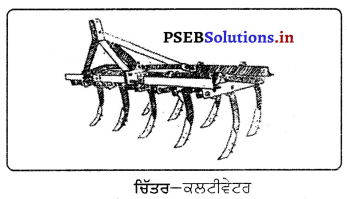
ਪ੍ਰਸ਼ਨ 5.
ਰੋਟਾਵੇਟਰ ਬਾਰੇ ਤੁਸੀਂ ਕੀ ਜਾਣਦੇ ਹੋ ?
ਉੱਤਰ-
ਇਸ ਦੀ ਵਰਤੋਂ ਖੇਤ ਦੀ ਤਿਆਰੀ ਕਰਨ ਲਈ ਹੁੰਦੀ ਹੈ । ਇਹ ਮਿੱਟੀ ਨੂੰ ਭੁਰਭੁਰਾ ਬਣਾ ਕੇ ਬਿਜਾਈ ਲਈ ਤਿਆਰ ਕਰਨ ਦਾ ਕੰਮ ਕਰਦਾ ਹੈ ਅਤੇ ਪਹਿਲੀ ਅਤੇ ਦੂਜੀ . ਦੋਵਾਂ ਜੁਤਾਈਆਂ ਲਈ ਵਰਤਿਆ ਜਾ ਸਕਦਾ ਹੈ । ਇਸ ਦੀ ਵਰਤੋਂ ਟਰੈਕਟਰ ਨਾਲ ਕੀਤੀ ਜਾਂਦੀ ਹੈ ।

ਪ੍ਰਸ਼ਨ 6.
ਲੇਜ਼ਰ ਲੈਂਡ ਲੈਵਲਰ ਦੀ ਵਰਤੋਂ ਬਾਰੇ ਦੱਸੋ ।
ਉੱਤਰ-
ਇਹ ਜ਼ਮੀਨ ਨੂੰ ਪੱਧਰਾ ਕਰਨ ਦਾ ਆਧੁਨਿਕ ਤਰੀਕਾ ਹੈ । ਇਸ ਵਿਚ ਲੇਜ਼ਰ ਕਿਰਨਾਂ ਦੀ ਵਰਤੋਂ ਹੁੰਦੀ ਹੈ ਜਿਸ ਨਾਲ ਮਿੱਟੀ ਖੁਰਚਣ ਵਾਲੇ ਬਲੇਡਾਂ ਨੂੰ ਉੱਪਰ-ਥੱਲੇ ਕਰਨਾ ਸੌਖਾ ਹੁੰਦਾ ਹੈ । ਲੇਜ਼ਰ ਲੈਵਲਰ ਵਿਚ ਇੱਕ ਤਿੰਨ ਟੰਗਾਂ ਵਾਲਾ ਸਟੈਂਡ ਤੇ ਲੇਜ਼ਰ ਟਰਾਂਸਮੀਟਰ ਲੱਗਾ ਹੁੰਦਾ ਹੈ । ਇਸ ਤੋਂ ਜ਼ਮੀਨ ਦੇ ਉੱਚਾ-ਨੀਚਾ ਹੋਣ ਦੀ ਸੂਚਨਾ ਮਿਲਦੀ ਹੈ ਤੇ ਟਰੈਕਟਰ ਉੱਚੀ ਜਗਾ ਤੋਂ ਮਿੱਟੀ ਪੁੱਟ ਕੇ ਨੀਵੇਂ ਥਾਂ ਤੇ ਪਾਉਂਦਾ ਹੈ ਤੇ ਇਸ ਤਰ੍ਹਾਂ ਜ਼ਮੀਨ ਪੱਧਰੀ ਹੋ ਜਾਂਦੀ ਹੈ ।
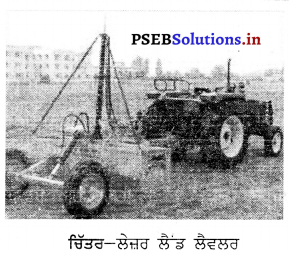
ਪ੍ਰਸ਼ਨ 7.
ਜ਼ੀਰੋ ਟਿਲ ਡਰਿਲ ਬਾਰੇ ਤੁਸੀਂ ਕੀ ਜਾਣਦੇ ਹੋ ?
ਉੱਤਰ-
ਝੋਨੇ ਦੀ ਵਾਢੀ ਕਰਨ ਤੋਂ ਬਾਅਦ ਜ਼ਮੀਨ ਵਿਚ ਨਮੀ ਬਚ ਜਾਂਦੀ ਹੈ । ਅਜਿਹੀ ਹਾਲਤ ਵਿਚ ਖੇਤ ਦੀ ਜੁਤਾਈ ਕੀਤੇ ਬਿਨਾਂ ਕਣਕ ਦੀ ਬਿਜਾਈ ਕੀਤੀ ਜਾਂਦੀ ਹੈ । ਇਸ ਨਾਲ ਇੱਕ ਘੰਟੇ ਵਿਚ ਇਕ ਏਕੜ ਦੀ ਬਿਜਾਈ ਹੋ ਜਾਂਦੀ ਹੈ ! ਝੋਨੇ ਦੀ ਪਰਾਲੀ ਨੂੰ ਜਲਾਉਣ ਦੀ ਲੋੜ ਨਹੀਂ ਪੈਂਦੀ ।
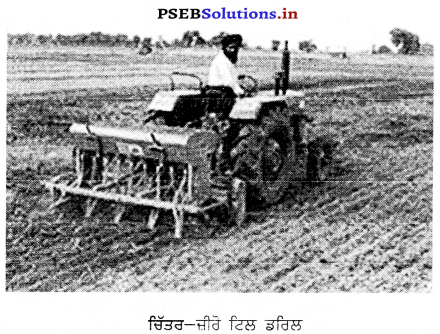

ਪ੍ਰਸ਼ਨ 8.
ਫ਼ਸਲ ਸੁਰੱਖਿਆ ਸੰਬੰਧੀ ਛਿੜਕਾਅ ਸੰਦਾਂ ਬਾਰੇ ਦੱਸੋ ?
ਉੱਤਰ-
ਹੱਥਾਂ ਨਾਲ ਚੱਲਣ ਵਾਲਾ ਸਪਰੇਅਰ, ਪੈਰਾਂ ਨਾਲ ਚੱਲਣ ਵਾਲਾ ਸਪਰੇਅਰ, ਬਾਲਟੀ ਸਪਰੇਅਰ, ਰੌਕਰ ਸਪਰੇਅਰ, ਨੈਪਸੈਕ ਸਪਰੇਅਰ, ਇੰਜਨ ਨਾਲ ਚੱਲਣ ਵਾਲਾ ਹੇਰੋ ਬਲਾਸਟ ਸਪਰੇਅਰ ।
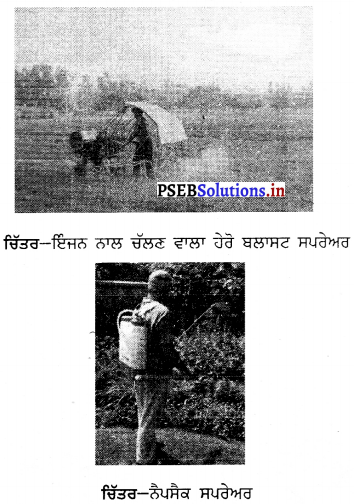
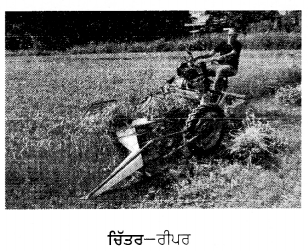
ਪ੍ਰਸ਼ਨ 9.
ਅਸੀਂ ਫ਼ਸਲਾਂ ਤੇ ਦਵਾਈਆਂ ਦਾ ਛਿੜਕਾਅ ਕਿਉਂ ਕਰਦੇ ਹਾਂ ?
ਉੱਤਰ-
ਖੜੀ ਫ਼ਸਲ ਵਿਚ ਕੀੜੇ-ਮਕੌੜੇ ਜਾਂ ਨਦੀਨਾਂ ਦੀ ਰੋਕਥਾਮ ਕਰਨ ਲਈ ਫ਼ਸਲਾਂ ਤੇ ਦਵਾਈਆਂ ਦਾ ਛਿੜਕਾਅ ਕੀਤਾ ਜਾਂਦਾ ਹੈ ।
ਪ੍ਰਸ਼ਨ 10.
ਨਦੀਨਾਂ ਦੀ ਰੋਕਥਾਮ ਕਿਵੇਂ ਕੀਤੀ ਜਾ ਸਕਦੀ ਹੈ ?
ਉੱਤਰ-
ਨਦੀਨਾਂ ਦੀ ਰੋਕਥਾਮ ਲਈ ਗੋਡੀ ਕਰਨੀ ਚਾਹੀਦੀ ਹੈ ਤੇ ਨਦੀਨ ਪੁੱਟ ਕੇ ਸਾੜ ਦੇਣੇ ਚਾਹੀਦੇ ਹਨ ਤੇ ਨਦੀਨਨਾਸ਼ਕ ਦਵਾਈਆਂ ਦੀ ਵਰਤੋਂ ਵੀ ਕੀਤੀ ਜਾ ਸਕਦੀ ਹੈ ।
ਪ੍ਰਸ਼ਨ 11.
ਹੱਥ ਨਾਲੋਂ ਡਿਲ ਨਾਲ ਬੀਜ ਬੀਜਣਾ ਕਿਉਂ ਲਾਭਦਾਇਕ ਹੈ ?
ਉੱਤਰ-
ਇਸ ਨਾਲ ਬੀਜ ਅਤੇ ਖ਼ਾਦ ਸਾਰੇ ਖੇਤ ਵਿਚ ਇਕਸਾਰ ਪੈਂਦੇ ਹਨ ਅਤੇ ਲੋੜ ਅਨੁਸਾਰ ਬੀਜ ਅਤੇ ਖ਼ਾਦ ਦੀ ਮਾਤਰਾ ਵਧਾਈ ਜਾ ਸਕਦੀ ਹੈ । ਇਸ ਦੇ ਮੁਕਾਬਲੇ ਹੱਥਾਂ ਨਾਲ ਪੋਰਾ ਕਰਨ ਤੇ ਬੀਜ ਵੱਧ ਘੱਟ ਹੋ ਜਾਂਦਾ ਹੈ ਅਤੇ ਬੀਜ ਨੂੰ ਇਕਸਾਰ ਕਰਨ ਲਈ ਬਹੁਤ ਜ਼ਿਆਦਾ ਮੁਹਾਰਤ ਦੀ ਲੋੜ ਹੁੰਦੀ ਹੈ ।
ਪ੍ਰਸ਼ਨ 12.
ਟੋਕਾ ਕਿਸ ਨੂੰ ਆਖਦੇ ਹਨ ? ਇਹ ਕਿਸ ਕੰਮ ਆਉਂਦਾ ਹੈ ? ਇਹ ਕਿਵੇਂ ਚਲਦਾ ਹੈ ?
ਉੱਤਰ-
ਪਿੰਡਾਂ ਵਿਚ ਹਰ ਘਰ ਵਿਚ | ਪਸ਼ੂ ਹੁੰਦੇ ਹਨ ਤੇ ਇਹਨਾਂ ਨੂੰ ਚਾਰਾ ਕੁਤਰ ਕੇ ਪਾਉਣ ਲਈ ਟੋਕਾ ਮਸ਼ੀਨ ਦੀ ਵਰਤੋਂ ਕੀਤੀ ਜਾਂਦੀ ਹੈ । ਇਹ ਮਸ਼ੀਨ ਹੱਥਾਂ ਨਾਲ, ਬਿਜਲੀ ਦੀ ਮੋਟਰ ਨਾਲ ਅਤੇ ਡੀਜ਼ਲ ਇੰਜਣ ਨਾਲ ਚਲਾਈ ਜਾ ਸਕਦੀ।
ਹੈ ।
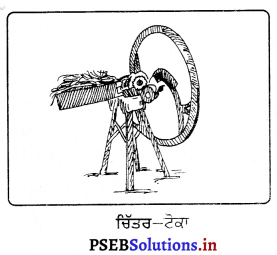
ਪ੍ਰਸ਼ਨ 13.
ਟਿੱਲਰ ਕਿਸ ਕੰਮ ਆਉਂਦਾ ਹੈ ?
ਉੱਤਰ-
ਇਸ ਦੀ ਵਰਤੋਂ ਜ਼ਮੀਨ ਵਾਹੁਣ ਲਈ ਹੁੰਦੀ ਹੈ । ਇਸ ਨੂੰ ਟਰੈਕਟਰ ਨਾਲ ਜੋੜ ਕੇ ਜ਼ਮੀਨ ਵਾਹੁਣ ਦਾ ਕੰਮ ਕੀਤਾ ਜਾਂਦਾ ਹੈ ।

ਪ੍ਰਸ਼ਨ 14.
ਡਿਸਕ ਹੈਰੋਂ ਕਿਸ ਕੰਮ ਆਉਂਦਾ ਹੈ ?
ਉੱਤਰ-
ਇਸ ਨੂੰ ਖੇਤੀ ਦੀ ਮੁੱਢਲੀ ਵਹਾਈ ਲਈ ਵਰਤਿਆ ਜਾਂਦਾ ਹੈ । ਇਸ ਨੂੰ ਤਵੀਆਂ ਵੀ ਕਹਿੰਦੇ ਹਨ ।
ਵੱਡੇ ਉੱਤਰਾਂ ਵਾਲੇ ਪ੍ਰਸ਼ਨ
ਪ੍ਰਸ਼ਨ 1.
ਖੇਤੀ ਮਸ਼ੀਨਾਂ ਦਾ ਆਧੁਨਿਕ ਯੁੱਗ ਵਿਚ ਕੀ ਮਹੱਤਵ ਹੈ ?
ਉੱਤਰ-
- ਫ਼ਸਲ ਦੀ ਬਿਜਾਈ ਜਲਦੀ ਅਤੇ ਸਸਤੀ ਹੋ ਜਾਂਦੀ ਹੈ ।
- ਬੂਟਿਆਂ ਅਤੇ ਬੂਟਿਆਂ ਵਿਚ ਕਤਾਰਾਂ ਦਾ ਫ਼ਾਸਲਾ ਬਿਲਕੁਲ ਠੀਕ ਤਰ੍ਹਾਂ ਰੱਖਿਆ ਜਾਂਦਾ ਹੈ ।
- ਕਤਾਰਾਂ ਵਿਚ ਬੀਜਣ ਕਰਕੇ ਫ਼ਸਲ ਦੀ ਗੋਡੀ ਸੌਖੀ ਹੋ ਜਾਂਦੀ ਹੈ ।
- ਬੀਜ ਅਤੇ ਖ਼ਾਦ ਨਿਸਚਿਤ ਡੂੰਘਾਈ ਅਤੇ ਯੋਗ ਫ਼ਾਸਲੇ ਤੇ ਕੇਰੇ ਜਾਂਦੇ ਹਨ ।
- ਡਰਿੱਲ ਨਾਲ ਬੀਜੀ ਹੋਈ ਫ਼ਸਲ ਤੋਂ 10 ਤੋਂ 15% ਤਕ ਵੱਧ ਝਾੜ ਪ੍ਰਾਪਤ ਹੋ ਜਾਂਦਾ ਹੈ ।
ਪ੍ਰਸ਼ਨ 2.
ਖੇਤੀ ਕਾਰਜਾਂ ਲਈ ਵਰਤੀਆਂ ਜਾਣ ਵਾਲੀਆਂ ਮਸ਼ੀਨਾਂ ਦੇ ਨਾਂ ਦੱਸੋ ਤੇ ਟਰੈਕਟਰ ਦਾ ਵੇਰਵਾ ਦਿਓ ।
ਉੱਤਰ-
ਖੇਤੀ ਕਾਰਜਾਂ ਲਈ ਵਰਤੀਆਂ ਜਾਣ ਵਾਲੀਆਂ ਮਸ਼ੀਨਾਂ ਹਨ ਟਰੈਕਟਰ, ਡੀਜ਼ਲ ਇੰਜਣ, ਬਿਜਲੀ ਨਾਲ ਚੱਲਣ ਵਾਲੀ ਮੋਟਰ, ਪੱਠੇ ਕੁਤਰਨ ਵਾਲੀ ਮਸ਼ੀਨ, ਬੀਜ ਅਤੇ ਖਾਦ ਡਰਿੱਲ ਆਦਿ ।
ਟਰੈਕਟਰ – ਸਭ ਤੋਂ ਵੱਧ ਖੇਤੀ ਵਿਚ ਕੰਮ ਆਉਣ ਵਾਲੀ ਮਸ਼ੀਨ ਟਰੈਕਟਰ ਹੈ । ਇਸ ਦੀ ਸ਼ਕਤੀ 5 ਹਾਰਸ ਪਾਵਰ ਤੋਂ ਲੈ ਕੇ 90 ਹਾਰਸ ਪਾਵਰ ਤਕ ਹੋ ਸਕਦੀ ਹੈ । ਇਸ ਤੋਂ ਬਹੁਤ

ਸਾਰੇ ਕੰਮ ਲਏ ਜਾਂਦੇ ਹਨ । ਜਿਸ ਤਰ੍ਹਾਂ ਜ਼ਮੀਨ ਦੀ ਵਹਾਈ ਕਰਨਾ, ਖੇਤੀ ਦੀ ਵਰਤੋਂ ਸੰਬੰਧੀ ਢੋਆ-ਢੁਆਈ, ਜ਼ਮੀਨ ਵਿਚੋਂ ਪਾਣੀ ਕੱਢਣ ਲਈ ਟਿਉਬਵੈੱਲ ਚਲਾਉਣਾ ਆਦਿ ਸ਼ਾਮਲ ਹਨ । ਭਾਵੇਂ ਟਿਊਬਵੈੱਲਾਂ ਨੂੰ ਚਲਾਉਣ ਲਈ ਡੀਜ਼ਲ ਇੰਜਣ ਜਾਂ ਬਿਜਲੀ ਦੀ ਮੋਟਰ ਬਹੁਤ ਸਸਤੀ ਪੈਂਦੀ ਹੈ, ਫਿਰ ਵੀ ਜਿੱਥੇ ਕਿਤੇ ਇਹ ਸਾਧਨ ਉਪਲੱਬਧ ਨਹੀਂ ਹਨ, ਉੱਥੇ ਕਿਸਾਨ ਟਰੈਕਟਰ ਨਾਲ ਹੀ ਪਾਣੀ ਕੱਢਣ ਲਈ ਟਿਉਬਵੈੱਲ ਚਲਾ ਲੈਂਦੇ ਹਨ । ਫ਼ਸਲਾਂ ਦੀ ਗਹਾਈ ਅਤੇ ਕੰਬਾਈਨਾਂ ਚਲਾਉਣ ਲਈ ਵੀ ਟਰੈਕਟਰ ਵਰਤਿਆ ਜਾਂਦਾ ਹੈ ।
ਪ੍ਰਸ਼ਨ 3.
ਉਲਟਾਵਾਂ ਹਲ ਕੀ ਹੈ ? ਇਹ ਦੁਜੇ ਹਲਾਂ ਨਾਲੋਂ ਕਿਵੇਂ ਭਿੰਨ ਹੈ ?
ਉੱਤਰ-
ਇਹ ਹਲ ਲੋਹੇ ਦਾ ਬਣਿਆ ਹੁੰਦਾ ਹੈ । ਬਲਦਾਂ ਨਾਲ ਸਿਰਫ਼ ਇੱਕ ਜਦ ਕਿ ਟਰੈਕਟਰ ਨਾਲ 4 ਤੋਂ 6 ਹਲ ਇੱਕੋ ਸਮੇਂ ਚਲਾਏ ਜਾਂਦੇ ਹਨ । ਇਸ ਹਲ ਨਾਲ ਭੂਮੀ ਦੀ ਉੱਪਰਲੀ ਤਹਿ ਹੋਠਾਂ ਚਲੀ ਜਾਂਦੀ ਹੈ ਅਤੇ ਹੇਠਲੀ ਤਹਿ ਉੱਪਰ ਆ ਜਾਂਦੀ ਹੈ । ਜਦੋਂ ਪਹਿਲੀ ਫ਼ਸਲ ਵੱਢਣ ਅਤੇ ਦੂਜੀ ਫ਼ਸਲ ਦੀ ਬਿਜਾਈ ਵਿੱਚ ਵਕਫ਼ਾ ਵੱਧ ਹੋਵੇ ਤਾਂ ਉਲਟਾਵੇਂ ਹਲ ਦੀ ਵਰਤੋਂ ਕਾਫ਼ੀ ਲਾਹੇਵੰਦ ਰਹਿੰਦੀ ਹੈ ਕਿਉਂਕਿ ਇਸ ਨਾਲ ਘਾਹ-ਫੂਸ ਜ਼ਮੀਨ ਹੇਠਾਂ ਚਲਾ ਜਾਂਦਾ ਹੈ ਅਤੇ ਗਲ-ਸੜ ਕੇ ਖਾਦ ਬਣ ਜਾਂਦਾ ਹੈ ਅਤੇ ਜ਼ਮੀਨ ਹੇਠਲੀਆਂ ਜੜ੍ਹਾਂ ਅਤੇ ਹੋਰ ਘਾਹ-ਫੂਸ ਦੇ ਉੱਪਰ ਆ ਜਾਣ ਨਾਲ ਜ਼ਮੀਨ ਅੰਦਰਲੇ ਹਾਨੀਕਾਰਕ ਜੀਵਾਂਸ਼ਾਂ ਦਾ ਧੁੱਪ ਲੱਗਣ ਨਾਲ ਖ਼ਾਤਮਾ ਹੋ ਜਾਂਦਾ ਹੈ । ਬਲਦਾਂ ਨਾਲ ਖਿੱਚਣ ਵਾਲਾ ਹਲ ਲੱਕੜ ਦਾ ਹੁੰਦਾ ਹੈ ਤੇ ਅੱਗੇ ਫਾਲਾ ਲੱਗਾ ਹੁੰਦਾ ਹੈ ਜਦਕਿ ਉਲਟਾਵਾਂ ਹਲ ਲੋਹੇ ਦਾ ਬਣਿਆ ਹੁੰਦਾ ਹੈ । ਆਮ ਹਲ ਨਾਲ ਸਿਆੜ ਖੁੱਲਦਾ ਹੈ ਜਦਕਿ ਉਲਟਾਵੇਂ ਹਲ ਨਾਲ ਜ਼ਮੀਨ ਦੀ ਉੱਪਰਲੀ ਤਹਿ ਹੇਠਾਂ ਚਲੀ ਜਾਂਦੀ ਹੈ ਤੇ ਹੇਠਲੀ ਤਹਿ ਉੱਪਰ ਆ ਜਾਂਦੀ ਹੈ ।
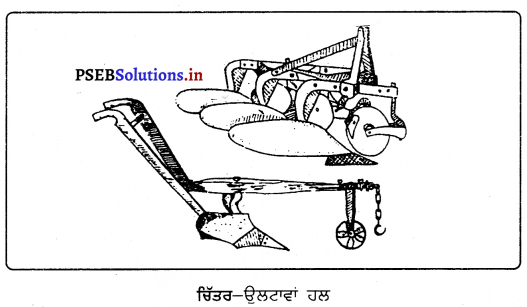
ਪ੍ਰਸ਼ਨ 4.
ਹੇਠ ਲਿਖੀਆਂ ਖੇਤੀ ਮਸ਼ੀਨਾਂ ਬਾਰੇ ਸੰਖੇਪ ਵੇਰਵਾ ਦਿਓ1. ਸੁਹਾਗਾ 2. ਜਿੰਦਰਾ ।
ਉੱਤਰ-
1. ਸੁਹਾਗਾ -ਹਲ ਵਾਹੁਣ ਤੋਂ ਪਿੱਛੋਂ ਭਾਂ ਨੂੰ ਪੱਧਰਾ ਕਰਨ ਅਤੇ ਕੇਰੇ ਨਾਲ ਕੀਤੀ ਬਿਜਾਈ ਤੋਂ ਬਾਅਦ ਬੀਜ ਢਕਣ ਲਈ ਜਿਹੜਾ ਸੰਦ ਫੇਰਿਆ ਜਾਂਦਾ ਹੈ ਉਸ ਨੂੰ ਸੁਹਾਗਾ ਕਹਿੰਦੇ ਹਨ । ਇਹ ਲੱਕੜੀ ਦਾ ਇਕ ਫੱਟਾ ਹੁੰਦਾ ਹੈ । ਇਸ ਦੀ ਲੰਬਾਈ 275 ਸੈਂਟੀਮੀਟਰ (ਲਗਭਗ 10 ਫੁੱਟ), ਚੌੜਾਈ 30 ਸੈਂਟੀਮੀਟਰ (1 ਫੁੱਟ) ਤੇ ਮੋਟਾਈ 15 ਸੈਂਟੀਮੀਟਰ (ਅੱਧਾ ਫੁੱਟ) ਹੁੰਦੀ ਹੈ । ਇਸ ਦੀ ਲੰਬਾਈ, ਚੌੜਾਈ ਤੇ ਮੋਟਾਈ ਵੱਧ ਘੱਟ ਵੀ ਹੋ ਸਕਦੀ ਹੈ | ਸੁਹਾਗੇ ਦੇ ਮੱਥੇ ਦੀ ਲੰਬਾਈ ਵਾਲੇ ਪਾਸੇ 7-8 ਸੈਂਟੀਮੀਟਰ ਚੌੜੀ ਲੋਹੇ ਦੀ ਪੱਤੀ ਲੱਗੀ ਹੁੰਦੀ ਹੈ, ਜੋ ਲੱਕੜ ਨੂੰ ਘਸਣ ਤੋਂ ਬਚਾਉਂਦੀ ਹੈ ਅਤੇ ਇਸ ਫੱਟੇ ਦੇ ਦੋਹਾਂ ਸਿਰਿਆਂ ਤੇ ਲੱਕੜ ਦੀਆਂ ਮੋਟੀਆਂ ਕਿੱਲੀਆਂ ਲੱਗੀਆਂ ਹੁੰਦੀਆਂ ਹਨ । ਇਹਨਾਂ ਕਿੱਲੀਆਂ ਨੂੰ ਕੰਨ ਕਹਿੰਦੇ ਹਨ । ਸੁਹਾਗੇ ਨੂੰ ਪੰਜਾਲੀ ਨਾਲ ਬੰਨ੍ਹਣ ਵਾਲਾ

ਰੱਸਾ ਇਹਨਾਂ ਕਿੱਲੀਆਂ ਨਾਲ ਹੀ ਬੰਨਿਆ ਜਾਂਦਾ ਹੈ । ਇਸ ਨੂੰ ਬਲਦਾਂ ਦੀਆਂ ਜੋੜੀਆਂ ਖਿੱਚਦੀਆਂ ਹਨ । ਜਿੱਥੇ ਸੁਹਾਗਾ ਤੋਂ ਨੂੰ ਪੱਧਰਾ ਕਰਦਾ ਹੈ ਉੱਥੇ ਇਹ ਭੋਂ ਵਿਚ ਪਏ ਵੇਲੇ ਵੀ ਤੋੜਦਾ ਹੈ । 10 ਫੁੱਟ ਲੰਬਾ ਸੁਹਾਗਾ ਟਰੈਕਟਰ ਨਾਲ ਅਤੇ 6 ਫੁੱਟ ਲੰਬਾ ਸੁਹਾਗਾ ਬਲਦਾਂ ਨਾਲ ਚਲਾਇਆ ਜਾਂਦਾ ਹੈ ।
2. ਜਿੰਦਰਾ – ਇਹ ਖੇਤਾਂ ਵਿਚ ਵੱਟਾਂ ਪਾਉਣ ਦੇ ਕੰਮ ਆਉਂਦਾ ਹੈ । ਆਧੁਨਿਕ ਖੇਤੀ ਲਈ ਜਿੰਦਰਾ ਕਿਸਾਨ ਲਈ ਬਹੁਤ ਸਹਾਈ ਸੰਦ ਹੈ । ਇਸ ਦੇ ਦਸਤੇ ਦੀ ਲੰਬਾਈ 175 ਸੈਂਟੀਮੀਟਰ ਹੁੰਦੀ ਹੈ । ਦਸਤੇ ਦੇ ਹੇਠਾਂ ਇਕ ਲੱਕੜ ਦੀ ਫੱਟੀ ਲੱਗੀ ਹੁੰਦੀ ਹੈ । ਲੱਕੜ ਦੀ ਫੱਟੀ ਦੇ ਹੇਠਲੇ ਸਿਰੇ ਤੇ 5-6 ਸੈਂਟੀਮੀਟਰ ਚੌੜੀ ਲੋਹੇ ਦੀ ਪੱਤੀ ਹੁੰਦੀ ਹੈ । ਲੱਕੜ ਦੀ ਫੱਟੀ ਨਾਲ ਦੋਹਾਂ ਸਿਰਿਆਂ ਤੇ ਇਕ-ਇਕ ਲੋਹੇ ਦਾ ਕੰਡਾ ਲੱਗਿਆ ਹੁੰਦਾ ਹੈ । ਇਹਨਾਂ ਕੰਡਿਆਂ ਵਿਚੋਂ ਰੱਸਾ ਲੰਘਾ ਕੇ ਇਕ ਕਿੱਲੀ ਨਾਲ ਬੰਨ ਲਿਆ ਜਾਂਦਾ ਹੈ । ਇਕ ਵਿਅਕਤੀ ਕਿੱਲੀ ਫੜ ਕੇ ਜੰਦਰੇ ਨੂੰ ਖਿੱਚਦਾ ਹੈ ਅਤੇ ਦੂਜਾ ਵਿਅਕਤੀ ਦਸਤੇ ਨੂੰ ਫੜ ਕੇ ਰੱਖਦਾ ਹੈ ।
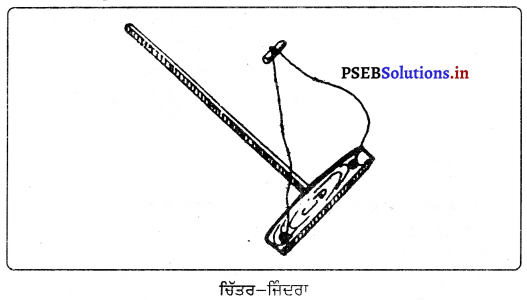

ਪ੍ਰਸ਼ਨ 5.
ਖੇਤਾਂ ਵਿਚ ਹਲ ਕਿਉਂ ਚਲਾਇਆ ਜਾਂਦਾ ਹੈ ? ਵਿਸਥਾਰ ਨਾਲ ਲਿਖੋ ।
ਉੱਤਰ-
ਚੰਗਾ ਨਤੀਜਾ ਪ੍ਰਾਪਤ ਕਰਨ ਲਈ ਪਹਿਲਾਂ ਚੰਗੀ ਤਿਆਰੀ ਕੀਤੀ ਜਾਂਦੀ ਹੈ । ਚੰਗੀ ਅਤੇ ਵਧੇਰੇ ਫ਼ਸਲ ਪ੍ਰਾਪਤ ਕਰਨ ਲਈ ਕਿਸਾਨ ਬਿਜਾਈ ਤੋਂ ਪਹਿਲਾਂ ਖੇਤ ਨੂੰ ਬਿਜਾਈ ਦੇ ਯੋਗ ਬਣਾਉਂਦਾ ਹੈ । ਉਹ ਖੇਤਾਂ ਵਿਚ ਵੱਤਰ ਦੇਖ ਕੇ ਹਲ ਚਲਾਉਂਦਾ ਹੈ । ਸ਼ੁਰੂ ਵਿਚ ਮਿੱਟੀਪਲਟ ਹਲ ਜਾਂ ਉਲਟਾਵਾਂ ਹਲ ਚਲਾਇਆ ਜਾਂਦਾ ਹੈ । ਖੇਤਾਂ ਵਿਚੋਂ ਪਿਛਲੀ ਫ਼ਸਲ ਦੀਆਂ ਜੜ੍ਹਾਂ ਮਿੱਟੀ ਉਲਟਨ ਨਾਲ ਥੋਂ ਦੇ ਉੱਪਰ ਆ ਜਾਂਦੀਆਂ ਹਨ । ਜਰ੍ਹਾਂ ਦੇ ਨਾਲ ਹੀ ਉਹਨਾਂ ਵਿਚ ਛੁਪੇ ਹੋਏ ਹਾਨੀਕਾਰਕ ਕੀੜੇ ਵੀ ਬਾਹਰ ਆ ਜਾਂਦੇ ਹਨ । ਇਹ ਕੀੜੇ ਧੁੱਪ ਲੱਗਣ ਨਾਲ ਮਰ ਜਾਂਦੇ ਹਨ : ਤੋਂ ਵਿਚ ਹਲ ਚਲਾਉਣ ਨਾਲ ਇਸ ਵਿਚ ਉੱਗ ਰਹੇ ਵਾਧੂ ਬੂਟੇ ਵੀ ਨਸ਼ਟ ਹੋ ਜਾਂਦੇ ਹਨ । ਹਲ ਵਾਹੁਣ ਨਾਲ ਮਿੱਟੀ ਦੇ ਕਣ ਖੁੱਲ ਜਾਂਦੇ ਹਨ ਅਤੇ ਇਸ ਤਰ੍ਹਾਂ ਤੋਂ ਵਿਚ ਹਵਾ ਦੀ ਆਵਾਜਾਈ ਸੌਖੀ ਹੋ ਜਾਂਦੀ ਹੈ ਤੇ ਪਾਣੀ ਸਿੰਮਣ ਜਾਂ ਜ਼ਜਬ ਕਰਨ ਦੀ ਸ਼ਕਤੀ ਵੱਧ ਜਾਂਦੀ ਹੈ । ਇਸ ਕਰਕੇ ਇਹ ਅਖਾਣ ‘ਜਿੰਨੀਆਂ ਸੀਆਂ ਲਵੇਂਗਾ, ਉੱਨਾ ਬੋਹਲ ਉਠਾਏਂਗਾ” ਪ੍ਰਸਿੱਧ ਹੈ ।
ਪ੍ਰਸ਼ਨ 6.
ਮਿੱਟੀ-ਪਲਟ ਹਲ ਨੂੰ ਕਿਹੜੇ-ਕਿਹੜੇ ਵਿਸ਼ੇਸ਼ ਕੰਮਾਂ ਲਈ ਵਰਤਿਆ ਜਾ ਸਕਦਾ ਹੈ ?
ਉੱਤਰ-
ਮਿੱਟੀ-ਪਲਟ ਹਲ ਨੂੰ ਹੇਠ ਲਿਖੇ ਵਿਸ਼ੇਸ਼ ਕੰਮਾਂ ਲਈ ਵਰਤਿਆ ਜਾਂਦਾ ਹੈ-
- ਖੇਤ ਨੂੰ ਪਹਿਲੀ ਵਾਰ ਵਾਹੁਣ ਸਮੇਂ ਇਸ ਦੀ ਵਰਤੋਂ ਨਾਲ ਮਿੱਟੀ ਉਲਟਾਈ ਜਾਂਦੀ ਹੈ ।
- ਹਰੀ ਖ਼ਾਦ ਬਣਾਉਣ ਲਈ ਖੇਤ ਵਿਚ ਖੜ੍ਹੀ ਫ਼ਸਲ ਨੂੰ ਇਸ ਨਾਲ ਵਾਹ ਕੇ ਤੋਂ ਵਿਚ ਦਬਾਇਆ ਜਾਂਦਾ ਹੈ ।
- ਇਸ ਤੋਂ ਖੇਤਾਂ ਵਿਚ ਵੱਟਾਂ ਪਾਉਣ ਦਾ ਕੰਮ ਵੀ ਲਿਆ ਜਾਂਦਾ ਹੈ ।
- ਇਸ ਨਾਲ ਖੇਤਾਂ ਵਿਚ ਖਾਲ਼ੀਆਂ ਬਣਾਈਆਂ ਜਾਂਦੀਆਂ ਹਨ ।
- ਇਸ ਨਾਲ ਖਾਦ ਅਤੇ ਰੂੜੀ ਰਲਾਉਣ ਦਾ ਕੰਮ ਵੀ ਲਿਆ ਜਾਂਦਾ ਹੈ ।
ਪ੍ਰਸ਼ਨ 7.
ਬੀਜ ਅਤੇ ਖਾਦ ਡਰਿੱਲ ਬਾਰੇ ਕੀ ਜਾਣਦੇ ਹੋ ?
ਉੱਤਰ-
ਇਹ ਇਕ ਅਜਿਹੀ ਮਸ਼ੀਨ ਹੈ ਜਿਸ ਨਾਲ ਖਾਦ ਅਤੇ ਬੀਜ ਪੋਰੇ ਜਾਂਦੇ ਹਨ । ਹੱਥਾਂ ਨਾਲ ਪੋਰਾ ਕਰਨ ਤੇ ਕਈ ਥਾਂਵਾਂ ‘ਤੇ ਬੀਜ ਵੱਧ ਤੇ ਕਈ ਥਾਂਵਾਂ ‘ਤੇ ਘੱਟ ਜਾਂਦੇ ਸਨ । ਪਰ ਇਸ ਮਸ਼ੀਨ ਦੀ ਵਰਤੋਂ ਨਾਲ ਬੀਜ ਅਤੇ ਖਾਦ ਸਾਰੇ ਖੇਤ ਵਿਚ ਇਕ-ਸਮਾਨ ਪੋਰੇ ਜਾਂਦੇ ਹਨ । ਇਸ ਦੀ ਵਰਤੋਂ ਨਾਲ ਬੀਜਾਂ ਅਤੇ ਖਾਦ ਦੀ ਮਾਤਰਾ ਵਧਾਈ ਵੀ ਜਾ ਸਕਦੀ ਹੈ । ਇਹ ਮਸ਼ੀਨ ਟਰੈਕਟਰ ਅਤੇ ਬਲਦਾਂ ਨਾਲ ਚੱਲਣ ਵਾਲੀ ਦੋਵੇਂ ਤਰ੍ਹਾਂ ਦੀ ਹੋ ਸਕਦੀ ਹੈ ।
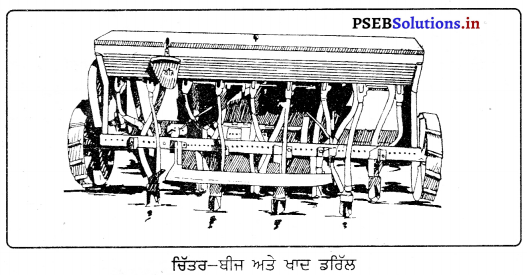
ਪ੍ਰਸ਼ਨ 8.
ਮਸ਼ੀਨਾਂ ਦੁਆਰਾ ਬੀਜਾਈ ਅਤੇ ਆਧੁਨਿਕ ਮਸ਼ੀਨਾਂ ਬਾਰੇ ਵਿਸਥਾਰ ਵਿਚ ਜਾਣਕਾਰੀ ਦਿਓ ।
ਉੱਤਰ-
ਖੇਤੀ ਦੀ ਮੁੱਖ ਮੰਗ ਸਮਾਂ, ਸ਼ਕਤੀ ਤੇ ਊਰਜਾ ਦੀ ਹੈ । ਜਦੋਂ ਸਾਰੇ ਕੰਮ ਹੱਥੀਂ ਕਰਨੇ ਪੈਂਦੇ ਸਨ ਤਾਂ ਕਈ-ਕਈ ਦਿਨ ਕੰਮ ਖ਼ਤਮ ਹੀ ਨਹੀਂ ਹੁੰਦੇ ਸਨ । ਹੁਣ ਆਧੁਨਿਕ ਯੁੱਗ ਵਿਚ ਮਨੁੱਖ ਨੇ ਕਈ ਤਰ੍ਹਾਂ ਦੀਆਂ ਮਸ਼ੀਨਾਂ ਦੀ ਕਾਢ ਕੱਢ ਲਈ ਹੈ ਤੇ ਕੰਮ ਬਹੁਤ ਜਲਦੀ ਖ਼ਤਮ ਹੋ ਜਾਂਦੇ ਹਨ । ਬਹੁਤ ਹੀ ਵੱਡੇ-ਵੱਡੇ ਖੇਤਰਫਲ ਨੂੰ ਮਸ਼ੀਨਾਂ ਦੀ ਸਹਾਇਤਾ ਨਾਲ ਦਿਨਾਂ ਵਿਚ ਹੀ ਤਿਆਰ ਵੀ ਕਰ ਲਿਆ ਜਾਂਦਾ ਹੈ ਤੇ ਬਿਜਾਈ ਵੀ ਕਰ ਲਈ ਜਾਂਦੀ ਹੈ ।
ਖੇਤੀ ਸੰਦ ਅਤੇ ਮਸ਼ੀਨਾਂ । ਬੀਜ ਖਾਦ ਡਰਿਲ ਦੀ ਸਹਾਇਤਾ ਨਾਲ ਕਣਕ, ਸਰੋਂ, ਬਾਜਰਾ, ਮੂੰਗੀ, ਜਵਾਰ, ਗਵਾਰ, ਛੋਲੇ ਆਦਿ ਦੀ ਬਿਜਾਈ ਕੀਤੀ ਜਾਂਦੀ ਹੈ ।
ਵਾਂਸਪਲਾਂਟਰ ਦੀ ਸਹਾਇਤਾ ਨਾਲ ਝੋਨੇ ਦੀ ਬਿਜਾਈ ਕੀਤੀ ਜਾਂਦੀ ਹੈ ।
ਜ਼ੀਰੋ ਟਿਲ ਡਰਿਲ ਅਤੇ ਬੈਡ ਪਲਾਂਟਰ ਦੀ ਸਹਾਇਤਾ ਨਾਲ ਕਣਕ ਦੀ ਬਿਜਾਈ ਕੀਤੀ ਜਾਂਦੀ ਹੈ ।
ਵੈਜ਼ੀਟੇਬਲ ਪਲਾਂਟਰ ਦੀ ਸਹਾਇਤਾ ਨਾਲ ਸਬਜ਼ੀਆਂ ਦੀ ਬਿਜਾਈ ਕੀਤੀ ਜਾਂਦੀ ਹੈ । ਕਾਟਨ ਪਲਾਂਟਰ ਦੀ ਸਹਾਇਤਾ ਨਾਲ ਕਪਾਹ ਅਤੇ ਨਰਮੇ ਦੀ ਬਿਜਾਈ ਕੀਤੀ ਜਾਂਦੀ ਹੈ ।
ਸ਼ੁਗਰਕੇਨ ਪਲਾਂਟਰ ਨਾਲ ਗੰਨੇ ਦੀ ਬਿਜਾਈ ਹੁੰਦੀ ਹੈ । ਰੋਟੇ ਦਿਲ ਵਿਚ ਡਰਿਲ ਬਿਜਾਈ ਤੋਂ ਪਹਿਲਾਂ ਨਾਲੋਂ-ਨਾਲ ਵਹਾਈ ਵੀ ਕਰਦਾ ਹੈ ।

ਪ੍ਰਸ਼ਨ 9.
ਗੁਡਾਈ ਸੰਬੰਧੀ ਖੇਤੀ ਸੰਦਾਂ ਬਾਰੇ ਜਾਣਕਾਰੀ ਦਿਓ ।
ਉੱਤਰ-
ਗੁਡਾਈ ਸੰਬੰਧੀ ਖੇਤੀ ਸੰਦ-ਖ਼ਾਲੀ ਖੇਤ ਹੋਵੇ ਤਾਂ ਉਸ ਵਿਚ ਕੁੱਝ ਬੇਲੋੜੇ ਪੌਦੇ ਉਗ ਜਾਂਦੇ ਹਨ ਤੇ ਕਈ ਵਾਰ ਉੱਗੀ ਹੋਈ ਫ਼ਸਲ ਵਿਚ ਵੀ ਕਈ ਫ਼ਾਲਤੂ ਬੇਲੋੜੇ ਪੌਦੇ ਉੱਗ ਜਾਂਦੇ ਹਨ ਜੋ ਫ਼ਸਲ ਨਾਲ ਪਾਣੀ, ਹਵਾ, ਰੋਸ਼ਨੀ, ਖ਼ੁਰਾਕ ਆਦਿ ਲਈ ਮੁਕਾਬਲਾ ਕਰਦੇ ਹਨ ਇਹਨਾਂ ਪੌਦਿਆਂ ਨੂੰ ਗੁਡਾਈ ਕਰਕੇ ਕੱਢ ਦਿੱਤਾ ਜਾਂਦਾ ਹੈ । ਗੁਡਾਈ ਕਰਨ ਲਈ ਕੁੱਝ ਸੰਦ ਹੱਥਾਂ ਨਾਲ ਚਲਾਏ ਜਾਂਦੇ ਹਨ ਤੇ ਕੁੱਝ ਮਸ਼ੀਨਾਂ ਨਾਲ । ਗੁਡਾਈ ਕਰਨ ਨਾਲ ਨਦੀਨ ਤਾਂ ਨਿਕਲ ਹੀ ਜਾਂਦੇ ਹਨ ਤੇ ਜ਼ਮੀਨ ਵੀ ਪੋਲੀ ਹੋ ਜਾਂਦੀ ਹੈ । ਇਸ ਤਰ੍ਹਾਂ ਪੌਦੇ ਦੇ ਵੱਧਣ-ਫੁਲਣ ਵਿਚ ਸਹਾਇਤਾ ਵੀ ਹੋ ਜਾਂਦੀ ਹੈ ।
ਹੱਥੀ ਵਰਤੇ ਜਾਣ ਵਾਲੇ ਗੁਡਾਈ ਸੰਦ-ਹੱਥੀਂ ਵਰਤੇ ਜਾਣ ਵਾਲੇ ਸੰਦ ਹਨ ਖੁਰਪੀ, ਕਸੌਲਾ, ਪਹੀਏਦਾਰ ਸੰਦ ਆਦਿ । ਖੁਰਪੀ ਦੀ ਵਰਤੋਂ ਕਿਸਾਨ ਸ਼ੁਰੂ ਤੋਂ ਹੀ ਕਰਦਾ ਆ ਰਿਹਾ ਹੈ ।
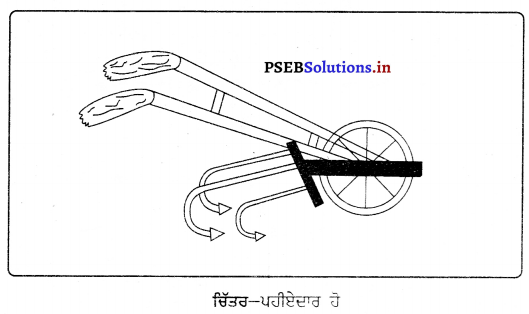
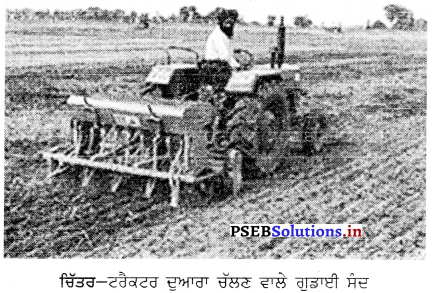
ਪਹੀਏਦਾਰ ਹੋ – ਇਸ ਦੀ ਸਹਾਇਤਾ ਨਾਲ ਖੜ੍ਹੀ ਫ਼ਸਲ ਵਿਚ ਗੁਡਾਈ ਕੀਤੀ ਜਾ ਸਕਦੀ ਹੈ । ਇਸ ਨੂੰ ਇਕ ਆਦਮੀ ਹੱਥਾਂ ਨਾਲ ਪਿਛੋਂ ਧੱਕਦਾ ਹੈ । ਪਹੀਏ ਦੇ ਪਿੱਛੇ 3-6 ਫਾਲੇ ਲੱਗੇ ਹੁੰਦੇ ਹਨ ।
ਟਰੈਕਟਰ ਦੀ ਸਹਾਇਤਾ ਨਾਲ ਚੱਲਣ ਵਾਲੇ ਗੁਡਾਈ ਸੰਦ – ਇਨਾਂ ਸੰਦਾਂ ਵਿਚ ਕਲਟੀਵੇਟਰ ਮੁੱਖ ਹੈ । ਇਹ ਨਦੀਨਾਂ ਨੂੰ ਤਾਂ ਨਸ਼ਟ ਕਰਦਾ ਹੀ ਹੈ ਪਰ ਨਮੀ ਨੂੰ ਵੀ ਬਚਾ ਕੇ ਰੱਖਦਾ ਹੈ ! ਇਸ ਨੂੰ ਸਖ਼ਤ ਅਤੇ ਪਥਰੀਲੀ ਜ਼ਮੀਨ ਤੇ ਵੀ ਵਧੀਆ ਤਰੀਕੇ ਨਾਲ ਵਰਤਿਆ ਜਾ ਸਕਦਾ ਹੈ । ਇਹ ਘਾਹ ਅਤੇ ਨਦੀਨਾਂ ਨੂੰ ਜੜ੍ਹਾਂ ਸਮੇਤ ਖੇਤ ਦੇ ਕਿਨਾਰੇ ਤੇ ਲੈ ਆਉਂਦਾ ਹੈ । ਇਸ ਵਿਚ ਕਈ ਤਰ੍ਹਾਂ ਦੇ ਫਾਲੋ ਅਤੇ ਬਲੇਡ ਆਦਿ ਲਗਾਏ ਜਾ ਸਕਦੇ ਹਨ ।
ਸਵੈਚਾਲਿਤ ਗੁਡਾਈ ਸੰਦ – ਇਸ ਨੂੰ ਪਾਵਰ ਟਿੱਲਰ ਨਾਲ ਚਲਾਇਆ ਜਾਂਦਾ ਹੈ । ਇਸ ਵਿਚ ਖਿੱਚਣ ਪ੍ਰਣਾਲੀ ਦੇ ਨਾਲ ਮੁੱਖ ਫ਼ਰੇਮ, ਹੈਂਡਲ, ਪ੍ਰਚਾਲਣ ਪਹੀਆ ਅਤੇ ਸਵੀਪ ਬਲੇਡ ਆਦਿ ਲੱਗੇ ਹੁੰਦੇ ਹਨ । ਪ੍ਰਚਾਲਣ ਪਹੀਆ ਸੰਦ ਨੂੰ ਫ਼ਸਲ ਵਿੱਚ ਚਲਾਉਣ ਵਿਚ ਸਹਾਇਕ ਹੁੰਦਾ ਹੈ ।
ਪ੍ਰਸ਼ਨ 10.
ਖੇਤੀ ਕਾਰਜਾਂ ਲਈ ਵਰਤੀਆਂ ਜਾਣ ਵਾਲੀਆਂ ਮਸ਼ੀਨਾਂ ਦੇ ਨਾਂ ਦੱਸੋ ਤੇ ਉਨ੍ਹਾਂ ਵਿਚੋਂ ਕਿਸੇ ਦੋ ਦਾ ਵੇਰਵਾ ਦਿਓ ।
ਉੱਤਰ-
ਖੇਤੀ ਕਾਰਜਾਂ ਲਈ ਵਰਤੀਆਂ ਜਾਣ ਵਾਲੀਆਂ ਮਸ਼ੀਨਾਂ ਹਨ-ਟਰੈਕਟਰ, ਡੀਜ਼ਲ ਇੰਜਣ, ਡਿਸਕ ਹੈਰੋ, ਉਲਟਾਵਾਂ ਹਲ, ਕਲਟੀਵੇਟਰ, ਰੋਟਾਵੇਟਰ, ਲੇਜ਼ਰ ਲੈਵਲਰ, ਬੀਜ ਖਾਦ ਡਰਿਲ, ਪਹਿਏਦਾਰ ਹੋ, ਸਪ੍ਰੇਅਰ ਜਿਵੇਂ ਨੈਪਸੈਕ ਸਪ੍ਰੇਅਰ, ਰੀਪਰ, ਕੰਬਾਈਨ ਹਾਰਵੈਸਟਰ, ਹੈਪੀਸੀਡਰ, ਪਰਾਲੀ ਚੌਪਰ ਆਦਿ ।
1. ਟਰੈਕਟਰ – ਟਰੈਕਟਰ ਇੱਕ ਅਜਿਹੀ ਮਸ਼ੀਨ ਹੈ ਜਿਸ ਦੀ ਵਰਤੋਂ ਖੇਤੀ ਵਿਚ ਸਭ ਤੋਂ ਵੱਧ ਹੁੰਦੀ ਹੈ । ਟਰੈਕਟਰ 5 ਹਾਰਸ ਪਾਵਰ ਤੋਂ ਲੈ ਕੇ 90 ਹਾਰਸ ਪਾਵਰ ਤੱਕ ਸ਼ਕਤੀ ਵਾਲੇ ਹੁੰਦੇ ਹਨ । ਇਸ ਦੀ ਵਰਤੋਂ ਜ਼ਮੀਨ ਦੀ ਵਹਾਈ, ਢੋਆ-ਢੁਆਈ, ਜ਼ਮੀਨ ਵਿੱਚੋਂ ਪਾਣੀ ਕੱਢਣ ਲਈ ਟਿਊਬਵੈੱਲ ਚਲਾਉਣਾ ਆਦਿ । ਇਸ ਦੀ ਵਰਤੋਂ ਫ਼ਸਲਾਂ ਦੀ ਗਹਾਈ ਅਤੇ ਕੰਬਾਈਨਾਂ ਚਲਾਉਣ ਲਈ ਵੀ ਕੀਤੀ ਜਾਂਦੀ ਹੈ । ਪੰਜਾਬ ਵਿੱਚ ਲਗਭਗ 4.76 ਲੱਖ ਟਰੈਕਟਰ ਹਨ ।
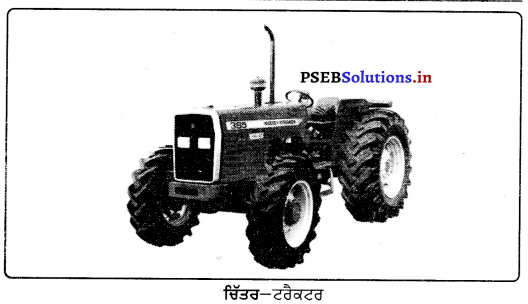
2. ਥਰੈਸ਼ਰ – ਇਸ ਦੀ ਵਰਤੋਂ ਦਾਣੇ ਕੱਢਣ (ਗਹਾਈ ਲਈ ਹੁੰਦੀ ਹੈ । ਇਸ ਦਾ ਮੁੱਖ ਕੰਮ ਫ਼ਸਲਾਂ ਦੀਆਂ ਬੱਲੀਆਂ ਵਿਚੋਂ ਦਾਣਿਆਂ ਨੂੰ ਬਿਨਾਂ ਤੋੜੇ ਵੱਖ ਕਰਨਾ ਹੁੰਦਾ ਹੈ । ਇਸ ਵਿੱਚ ਪੱਖੇ ਲੱਗੇ ਹੁੰਦੇ ਹਨ ਜੋ ਤੇਜ਼ ਰਫ਼ਤਾਰ ਨਾਲ ਹਵਾ ਸੁੱਟਦੇ ਹਨ ਤੇ ਦਾਣੇ ਸਾਫ਼ ਹੋ ਕੇ ਬਾਹਰ ਇਕੱਠੇ ਹੋ ਜਾਂਦੇ ਹਨ ।
ਪ੍ਰਸ਼ਨ 11.
ਹੇਠ ਲਿਖੇ ਖੇਤੀ ਸੰਦਾਂ ਬਾਰੇ ਸੰਖੇਪ ਵਿਚ ਵੇਰਵਾ ਦਿਓ । ਖੁਰਪਾ, ਜਿੰਦਰਾ, ਡਿਸਕ ਹੈਰੋਂ, ਟਿੱਲਰ ।
ਉੱਤਰ-
1. ਖੁਰਪਾ – ਇਸ ਸੰਦ ਦੀ ਵਰਤੋਂ ਖੇਤ ਵਿੱਚ ਗੁਡਾਈ ਕਰਨ ਲਈ ਕੀਤੀ ਜਾਂਦੀ ਹੈ । ਇਸ ਨੂੰ ਮਜ਼ਦੂਰ ਆਪ ਆਪਣੇ ਹੱਥਾਂ ਨਾਲ ਚਲਾਉਂਦੇ ਹਨ । ਇਸ ਨਾਲ ਨਦੀਨ ਮਾਰੇ ਵੀ ਜਾਂਦੇ ਹਨ ਤੇ ਕੱਢੇ ਵੀ ਜਾਂਦੇ ਹਨ ।
2. ਜ਼ਿੰਦਰਾ – ਇਸ ਸੰਦ ਦੀ ਵਰਤੋਂ ਖੇਤ ਵਿਚ ਵੱਟਾਂ ਪਾਉਣ ਲਈ ਕੀਤੀ ਜਾਂਦੀ ਹੈ । ਇਸ ਨੂੰ ਕਿਸਾਨ ਹੱਥਾਂ ਨਾਲ ਵੀ ਚਲਾ ਸਕਦੇ ਹਨ ਤੇ ਟਰੈਕਟਰ ਨਾਲ ਵੀ ਚਲਾ ਸਕਦੇ ਹਨ ।
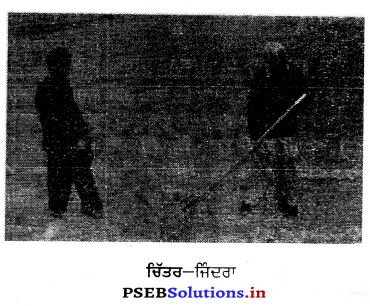
3. ਡਿਸਕ ਹੈਰੋਂ – ਇਸ ਨੂੰ ਆਮ ਕਰਕੇ ਤਵੀਆਂ ਕਿਹਾ ਜਾਂਦਾ ਹੈ ਕਿਉਂਕਿ ਇਸ ਨੂੰ ਕਈ ਤਵੇ ਜੋੜ ਕੇ ਬਣਾਇਆ ਜਾਂਦਾ ਹੈ । ਇਸ ਦੀ ਵਰਤੋਂ ਸਖ਼ਤ ਜ਼ਮੀਨ ਵਿਚ ਢੇਲਿਆਂ ਨੂੰ ਤੋੜਨ ਅਤੇ ਮਿੱਟੀ ਨੂੰ ਭੁਰਭੁਰਾ ਕਰਨ ਲਈ ਕੀਤੀ ਜਾਂਦੀ ਹੈ । ਇਸ ਦੀ ਵਰਤੋਂ ਨਾਲ ਨਦੀਨ ਖ਼ਤਮ ਹੋ ਜਾਂਦੇ ਹਨ, ਪਿਛਲੀ ਫ਼ਸਲ ਦੀ ਰਹਿੰਦ-ਖੂੰਹਦ ਮਿੱਟੀ ਵਿਚ ਮਿਲ ਜਾਂਦੀ ਹੈ, ਨਮੀ ਸੁਰੱਖਿਅਤ ਰਹਿੰਦੀ ਹੈ । ਇਸ ਸੰਦ ਦੀ ਵਰਤੋਂ ਖੇਤ ਦੀ ਮੁੱਢਲੀ ਵਹਾਈ ਲਈ ਵੀ ਕੀਤੀ ਜਾਂਦੀ ਹੈ ।
4. ਟਿੱਲਰ – ਇਸ ਨੂੰ ਬਲਦਾਂ ਦੁਆਰਾ ਖਿੱਚਿਆ ਜਾਂਦਾ ਹੈ । ਇਹ ਲੱਕੜ ਦਾ ਬਣਿਆ ਹੁੰਦਾ ਹੈ । ਇਸ ਦੇ ਅੱਗੇ ਲੋਹੇ ਦਾ ਫਾਲਾ ਲਗਾ ਹੁੰਦਾ ਹੈ । ਇਸ ਨਾਲ ਜ਼ਮੀਨ ਦੀ ਵਾਹੀ ਕੀਤੀ ਜਾਂਦੀ ਹੈ । ਇਸ ਨਾਲ ਸਿਆੜ ਖੁੱਦਾ ਹੈ ।
ਪ੍ਰਸ਼ਨ 12.
ਖੇਤ ਦੀ ਤਿਆਰੀ ਲਈ ਮੁੱਖ ਮਸ਼ੀਨਾਂ ਦੀ ਵਰਤੋਂ ਕਿਵੇਂ ਕੀਤੀ ਜਾਂਦੀ ਹੈ ?
ਉੱਤਰ-
ਖੇਤ ਦੀ ਤਿਆਰੀ ਲਈ ਵੱਖ-ਵੱਖ ਮਸ਼ੀਨਾਂ ਦੀ ਲੋੜ ਪੈਂਦੀ ਹੈ ਅਤੇ ਇਹਨਾਂ ਨੂੰ ਚਲਾਉਣ ਲਈ ਜਾਨਵਰਾਂ ਜਿਵੇਂ ਬਲਦ, ਊਠ, ਖੱਚਰ ਆਦਿ ਦੀ ਵਰਤੋਂ ਹੁੰਦੀ ਹੈ ਅਤੇ ਕਈ ਮਸ਼ੀਨਾਂ ਨੂੰ ਕਿਸਾਨ ਹੱਥਾਂ ਪੈਰਾਂ ਦੀ ਵਰਤੋਂ ਨਾਲ ਚਲਾਉਂਦਾ ਹੈ । ਮਸ਼ੀਨਰੀ ਨੂੰ ਚਲਾਉਣ ਲਈ ਊਰਜਾ ਜਾਂ ਸ਼ਕਤੀ ਦੀ ਲੋੜ ਪੈਂਦੀ ਹੈ । ਜਿਸ ਲਈ ਆਧੁਨਿਕ ਸਮੇਂ ਵਿੱਚ ਬਿਜਲੀ ਸ਼ਕਤੀ ਜਾਂ ਟਰੈਕਟਰ ਦੀ ਸਹਾਇਤਾ ਲਈ ਜਾਂਦੀ ਹੈ । ਕਈ ਮਸ਼ੀਨਾਂ ਸਿੱਧੇ ਹੀ ਬਿਜਲੀ ਨਾਲ ਚਲਦੀਆਂ ਹਨ ਤੇ ਕਈਆਂ ਨੂੰ ਟਰੈਕਟਰ ਨਾਲ ਜੋੜ ਕੇ ਵਰਤਿਆ ਜਾਂਦਾ ਹੈ । ਕਈ ਵਾਰ ਟਰੈਕਟਰ ਤੋਂ ਜਨਰੇਟਰ ਦਾ ਕੰਮ ਵੀ ਲਿਆ ਜਾਂਦਾ ਹੈ । ਇਸ ਤਰ੍ਹਾਂ ਮੁੱਖ ਮਸ਼ੀਨਾਂ ਦੀ ਵਰਤੋਂ ਜਾਨਵਰਾਂ, ਮਜ਼ਦੂਰਾਂ, ਬਿਜਲੀ ਸ਼ਕਤੀ, ਬਿਜਲੀ ਮੋਟਰਾਂ, ਟਰੈਕਟਰਾਂ ਆਦਿ ਦੀ ਸਹਾਇਤਾ ਨਾਲ ਕੀਤੀ ਜਾਂਦੀ ਹੈ ।

ਖੇਤੀ ਸੰਦ ਅਤੇ ਮਸ਼ੀਨਾਂ PSEB 6th Class Agriculture Notes
- ਖੇਤੀ ਦੀ ਪਹਿਲੀ ਜ਼ਰੂਰਤ ਊਰਜ਼ਾ ਤੇ ਸ਼ਕਤੀ ਦੀ ਹੈ ।
- ਸੰਸਾਰ ਵਿਚ ਸਭ ਤੋਂ ਵੱਧ ਪਸ਼ੂਆਂ ਦੀ ਗਿਣਤੀ ਭਾਰਤ ਵਿਚ ਹੈ ।
- ਖੇਤੀ ਕੰਮਾਂ ਲਈ ਬਲਦ, ਉਠ ਅਤੇ ਖੱਚਰਾਂ ਦੀ ਵਰਤੋਂ ਕੀਤੀ ਜਾਂਦੀ ਹੈ ।
- ਟਰੈਕਟਰ 5 ਹਾਰਸ ਪਾਵਰ ਤੋਂ ਲੈ ਕੇ 90 ਹਾਰਸ ਪਾਵਰ ਤੱਕ ਸ਼ਕਤੀ ਪ੍ਰਵਾਨ ਕਰ ਸਕਦੇ ਹਨ ।
- ਪੰਜਾਬ ਵਿਚ ਲਗਭਗ 4.76 ਲੱਖ ਟਰੈਕਟਰ ਹਨ ।
- ਡੀਜ਼ਲ ਇੰਜ਼ਣ ਟਰੈਕਟਰ ਤੋਂ ਛੋਟੀ ਮਸ਼ੀਨ ਹੈ ।
- ਪੰਜਾਬ ਵਿਚ 11.5 ਲੱਖ ਟਿਊਬਵੈੱਲ ਬਿਜਲੀ ਨਾਲ ਚਲਦੇ ਹਨ ।
- ਹਲ ਨਾਲ ਜ਼ਮੀਨ ਦੀ ਵਾਹੀ ਕੀਤੀ ਜਾਂਦੀ ਹੈ ।
- ਹੈਰੋਂ ਦੀ ਵਰਤੋਂ ਪਹਿਲੀ ਫ਼ਸਲ ਦੀ ਰਹਿੰਦ ਖੂੰਹਦ ਕੱਢਣ ਲਈ ਅਤੇ ਮੁੱਢਲੀ ਵਹਾਈ ਲਈ ਕੀਤੀ ਜਾਂਦੀ ਹੈ ।
- ਉਲਟਾਵੇਂ ਹਲ ਨਾਲ ਜ਼ਮੀਨ ਦੀ ਹੇਠਲੀ ਤਹਿ ਉੱਪਰ ਆ ਜਾਂਦੀ ਹੈ ।
- ਸੁਹਾਗਾ ਜ਼ਮੀਨ ਨੂੰ ਪੱਧਰਾ ਅਤੇ ਭੁਰਭੁਰਾ ਕਰਨ ਅਤੇ ਦਬਾਉਣ ਦੇ ਕੰਮ ਆਉਂਦਾ ਹੈ ।
- ਖੇਤ ਵਿੱਚ ਵੱਟਾਂ ਪਾਉਣ ਲਈ ਜ਼ਿੰਦਰਾ ਨਾਮਕ ਸੰਦ ਵਰਤਿਆ ਜਾਂਦਾ ਹੈ ।
- ਤਵੇਦਾਰ ਹਲ ਦਾ ਕੰਮ ਮਿੱਟੀ ਨੂੰ ਕੱਢ ਕੇ ਭੁਰਭੁਰਾ ਬਣਾਉਣਾ ਅਤੇ ਪਲਟਨਾ ਹੈ ।
- ਰੋਟਾਵੇਟਰ ਵੀ ਮਿੱਟੀ ਨੂੰ ਭੁਰਭੁਰਾ ਬਣਾ ਕੇ ਬਿਜਾਈ ਲਈ ਤਿਆਰ ਕਰਦਾ ਹੈ ।
- ਲੇਜ਼ਰ ਲੈਵਲਰ, ਜ਼ਮੀਨ ਨੂੰ ਪੱਧਰਾ ਕਰਨ ਦੀ ਬਹੁਤ ਹੀ ਨਵੀਂ ਤਕਨੀਕ ਹੈ । ਇਸ ਵਿਚ ਲੇਜ਼ਰ ਕਿਰਨਾਂ ਦੀ ਵਰਤੋਂ ਹੁੰਦੀ ਹੈ ।
- ਕੁੱਝ ਫ਼ਸਲਾਂ ਦੀ ਬਿਜਾਈ ਛੱਟਾ ਜਾਂ ਬੀਜ ਅਤੇ ਖਾਦ ਡਰਿਲ ਦੀ ਵਰਤੋਂ ਨਾਲ ਕੀਤੀ ਜਾਂਦੀ ਹੈ ।
- ਜ਼ਿਰੋ ਟਿਲ ਡਰਿਲ ਅਤੇ ਬੈਡ ਪਲਾਂਟਰ ਦੀ ਵਰਤੋਂ ਨਾਲ ਕਣਕ ਦੀ ਬਿਜਾਈ ਕੀਤੀ ਜਾਂਦੀ ਹੈ ।
- ਖੜੀ ਫ਼ਸਲ ਵਿਚ ਨਦੀਨਾਂ ਦੀ ਰੋਕਥਾਮ ਲਈ ਗੋਡੀ ਕੀਤੀ ਜਾਂਦੀ ਹੈ ।
- ਕਤਾਰਾਂ ਵਿਚ ਬੀਜੀਆਂ ਜਾਣ ਵਾਲੀਆਂ ਫ਼ਸਲਾਂ ਦੀ ਗੋਡੀ ਤਿਰਫਾਲੀ ਜਾਂ ਪਹੀਏ ਵਾਲੀ ਮਸ਼ੀਨ ਜਾਂ ਟਰੈਕਟਰ ਪਿੱਛੇ ਟਿੱਲਰ ਨਾਲ ਵੀ ਕੀਤੀ ਜਾ ਸਕਦੀ ਹੈ ।
- ਛਿੜਕਾਅ ਸੰਦ ਹਨ-ਹੱਥਾਂ ਨਾਲ ਚੱਲਣ ਵਾਲਾ ਸਪੇਅਰ, ਪੈਰਾਂ ਨਾਲ ਚੱਲਣ ਵਾਲਾ ਸਪ੍ਰੇਅਰ, ਰੌਕਰ ਸਪ੍ਰੇਅਰ, ਬਾਲਟੀ ਸਪ੍ਰੇਅਰ ਅਤੇ ਨੈਪਸੈਕ ਸਪ੍ਰੇਅਰ ।
- ਰੀਪਰ ਦੀ ਵਰਤੋਂ ਫ਼ਸਲਾਂ ਦੀ ਵਾਢੀ ਲਈ ਕੀਤੀ ਜਾਂਦੀ ਹੈ ।
- ਫ਼ਸਲਾਂ ਦੇ ਦਾਣੇ ਕੱਢਣ ਲਈ (ਗਹਾਈ) ਥਰੈਸ਼ਰਾਂ ਦੀ ਵਰਤੋਂ ਹੁੰਦੀ ਹੈ ।
- ਫ਼ਸਲ ਦੀ ਵਾਢੀ ਲਈ ਸਾਰੇ ਕੰਮ ਇਕੱਠੇ ਕਰਨ ਲਈ ਕੰਬਾਈਨ ਹਾਰਵੈਸਟਰ ਦੀ ਵਰਤੋਂ ਕੀਤੀ ਜਾਂਦੀ ਹੈ । ਜਿਵੇਂ-ਵਾਢੀ, ਗਹਾਈ, ਸਫਾਈ ਅਤੇ ਉਸਨੂੰ ਇਕੱਠਾ ਕਰਨਾ ।
- ਝੋਨੇ ਦੀ ਵਾਢੀ ਤੋਂ ਬਾਅਦ ਆਮ ਕਰਕੇ ਕਿਸਾਨ ਖੜੀ ਪਰਾਲੀ ਨੂੰ ਅੱਗ ਲਾ ਦਿੰਦੇ ਹਨ । ਜਿਸ ਨਾਲ ਖੇਤੀ ਲਈ ਚੰਗੇ ਖ਼ੁਰਾਕੀ ਤੱਤ ਸੜ ਜਾਂਦੇ ਹਨ ਅਤੇ ਵਾਤਾਵਰਨ ਦਾ ਪ੍ਰਦੂਸ਼ਣ ਵੀ ਹੁੰਦਾ ਹੈ ।
- ਝੋਨੇ ਦੀ ਵਾਢੀ ਤੋਂ ਬਾਅਦ ਪਰਾਲੀ ਨੂੰ ਖੇਤ ਵਿਚੋਂ ਕੱਢੇ ਬਿਨਾਂ ਕਣਕ ਦੀ ਸਿੱਧੀ । ਬਿਜਾਈ ਕਰਨ ਲਈ ਹੈਪੀ ਸੀਡਰ ਦੀ ਵਰਤੋਂ ਕੀਤੀ ਜਾ ਸਕਦੀ ਹੈ ।
- ਪਰਾਲੀ ਨੂੰ ਖੇਤਾਂ ਵਿਚ ਹੀ ਵਾਹੁਣ ਲਈ ਪਰਾਲੀ ਚੋਪਰ ਦੀ ਵਰਤੋਂ ਕੀਤੀ ਜਾਂਦੀ ਹੈ ।
![]()
![]()
![]()
![]()
![]()
![]()
![]()
![]()
![]()
![]()
![]()
![]()
